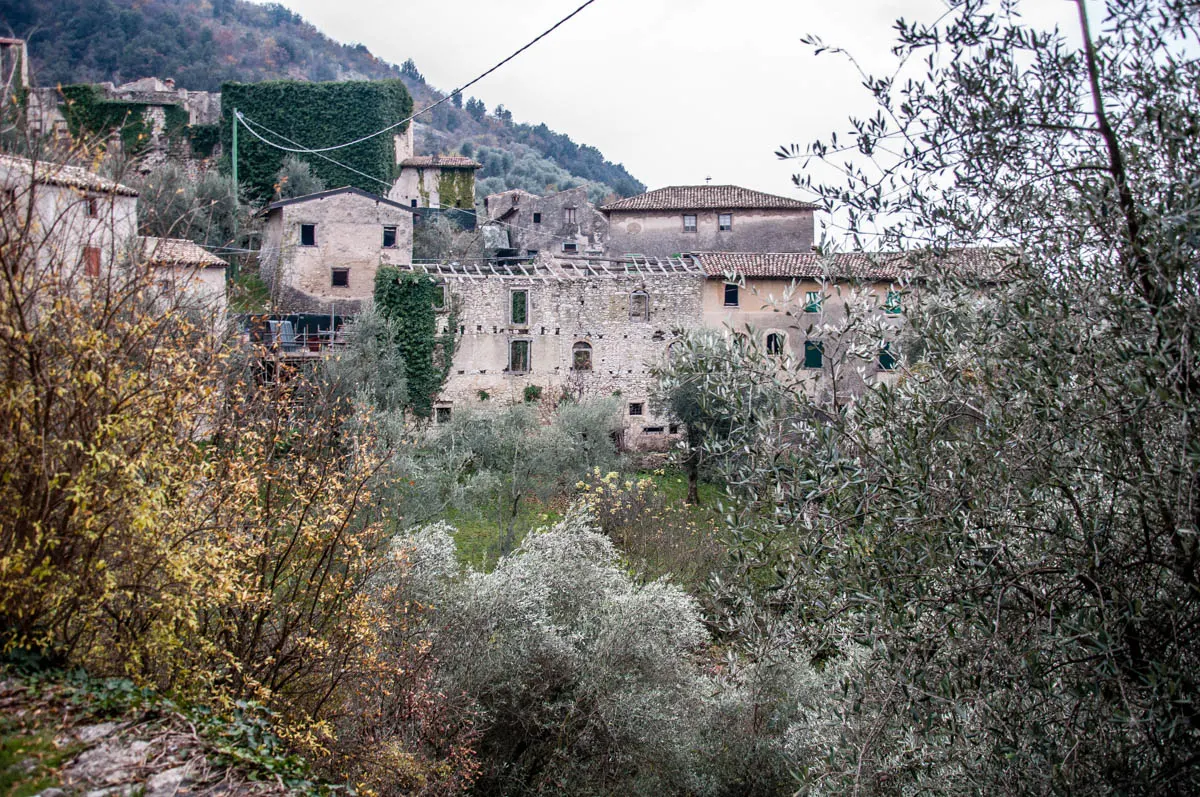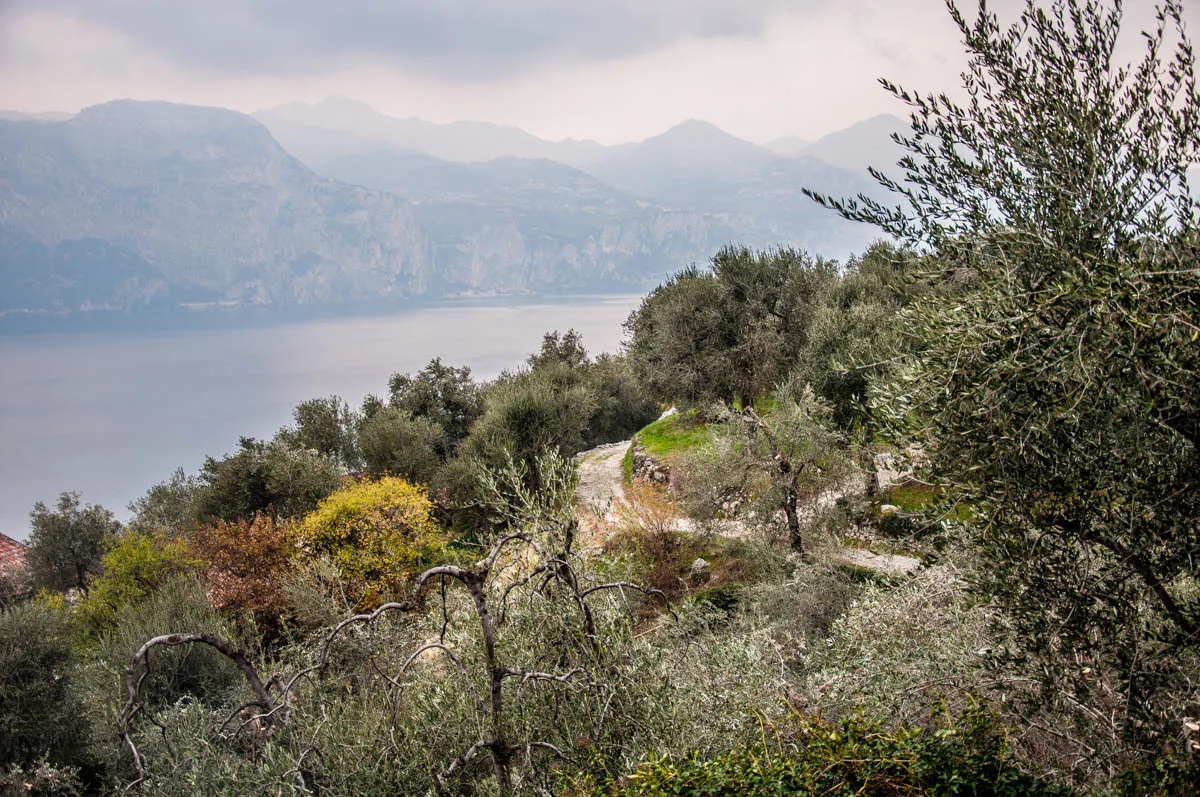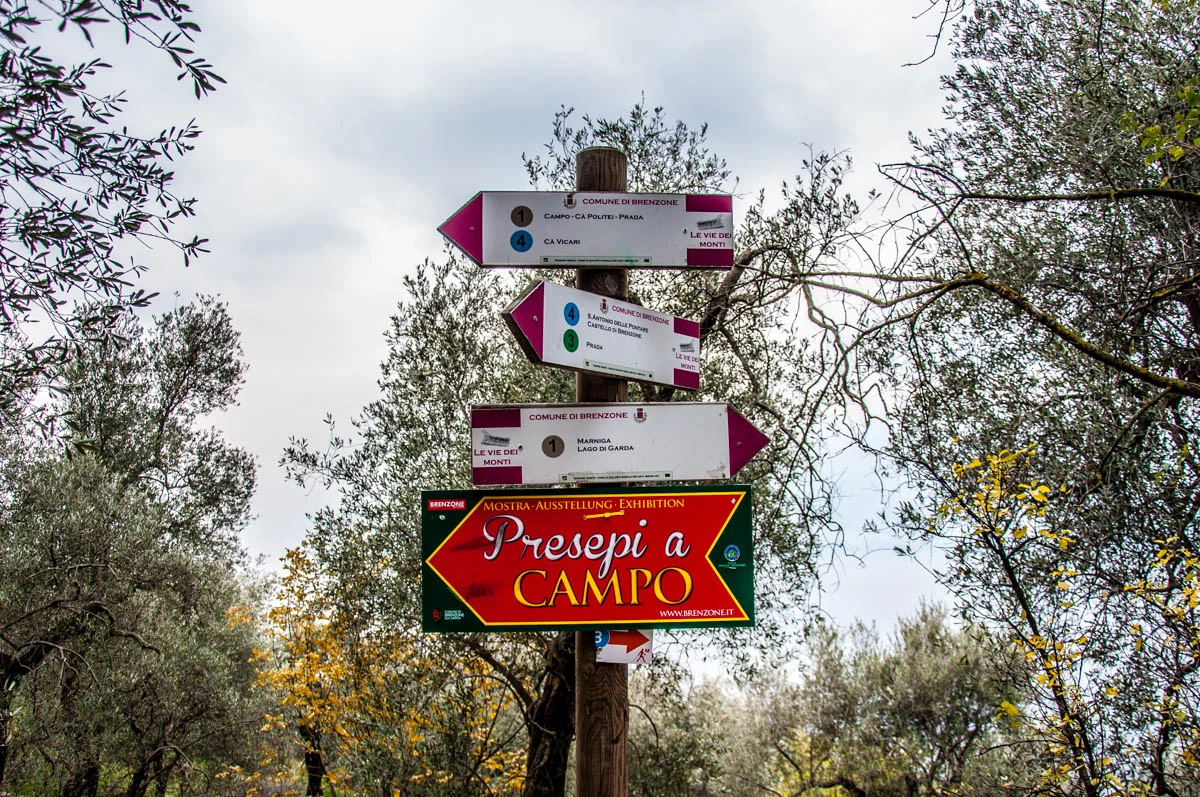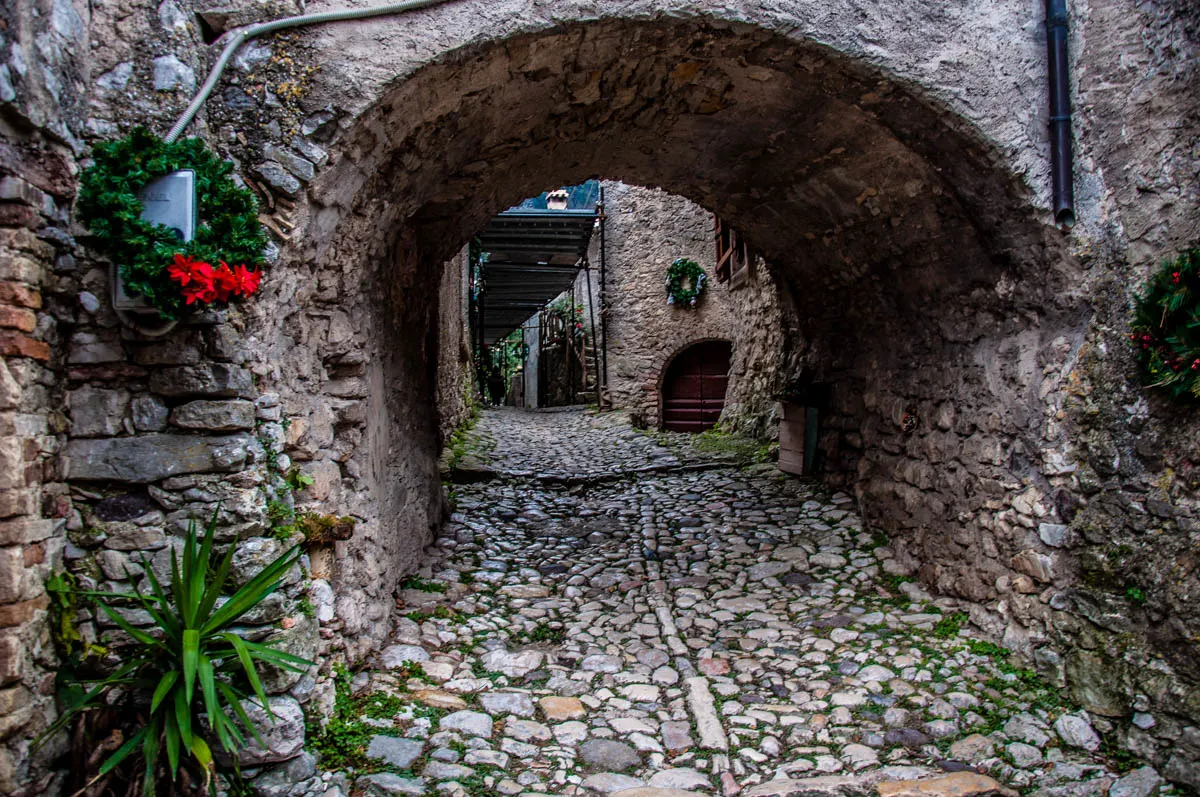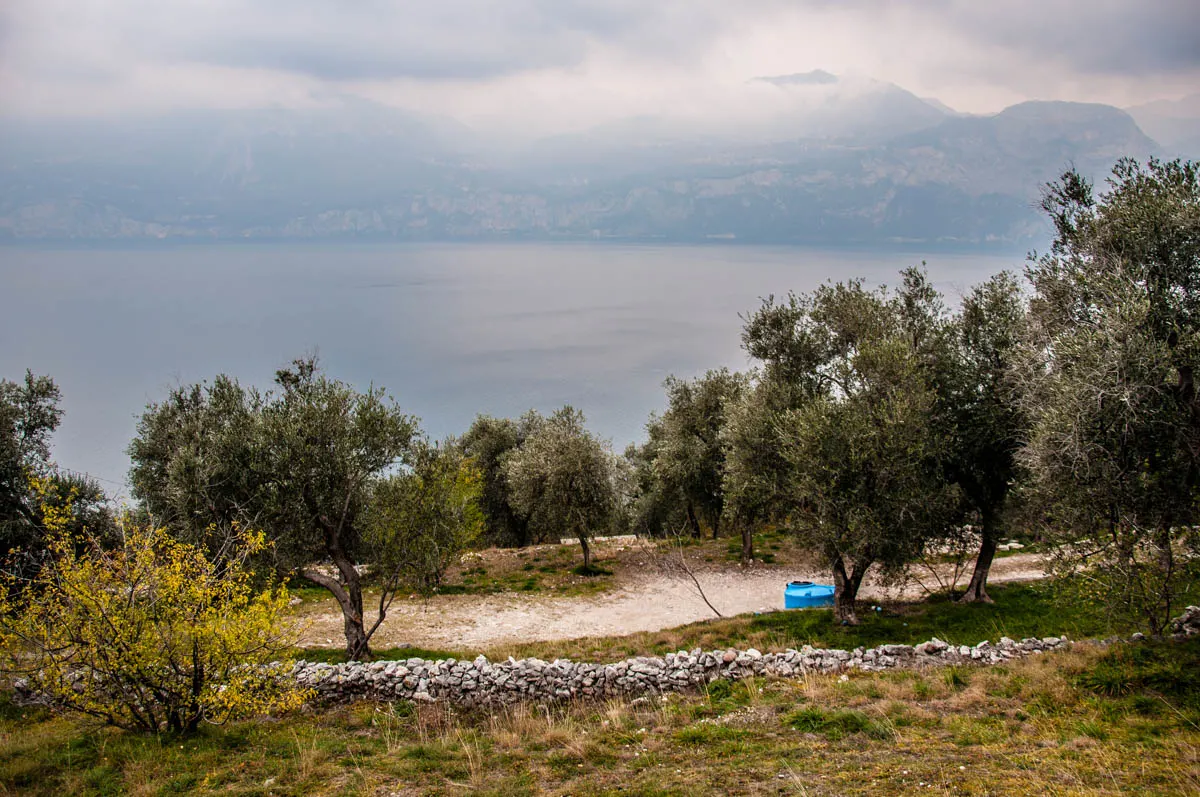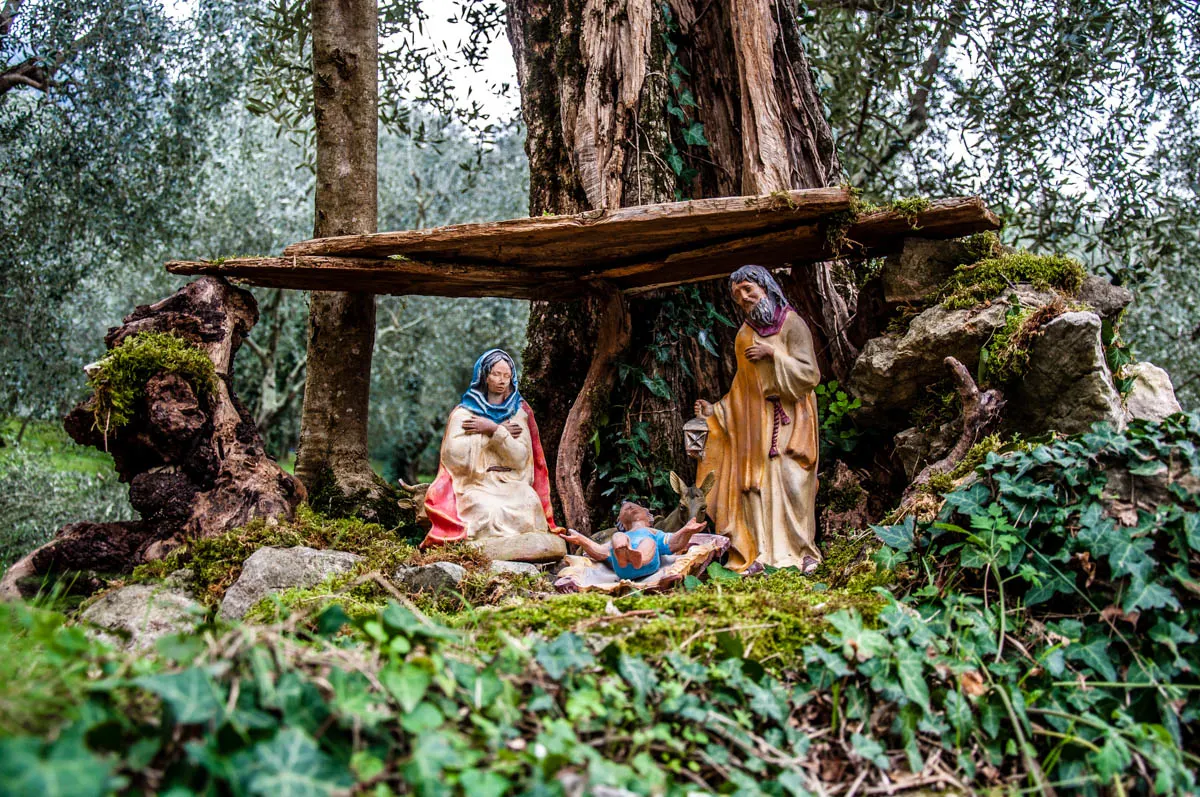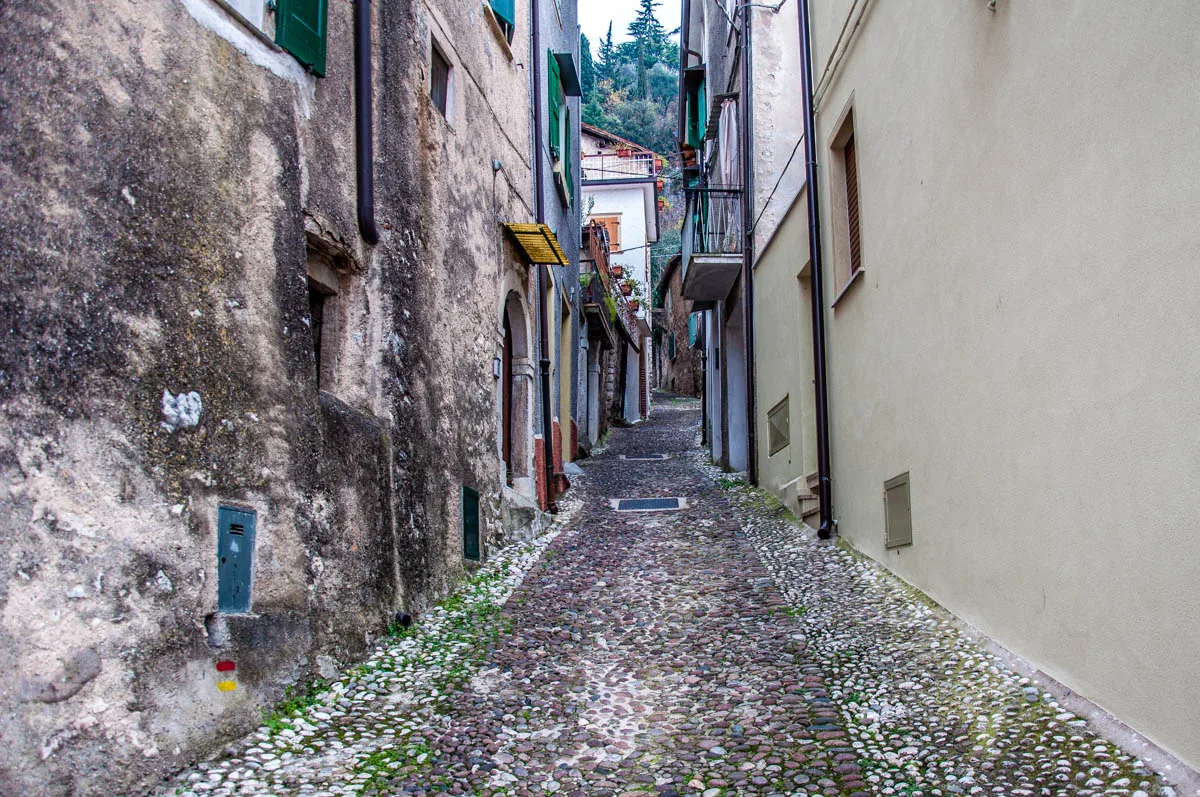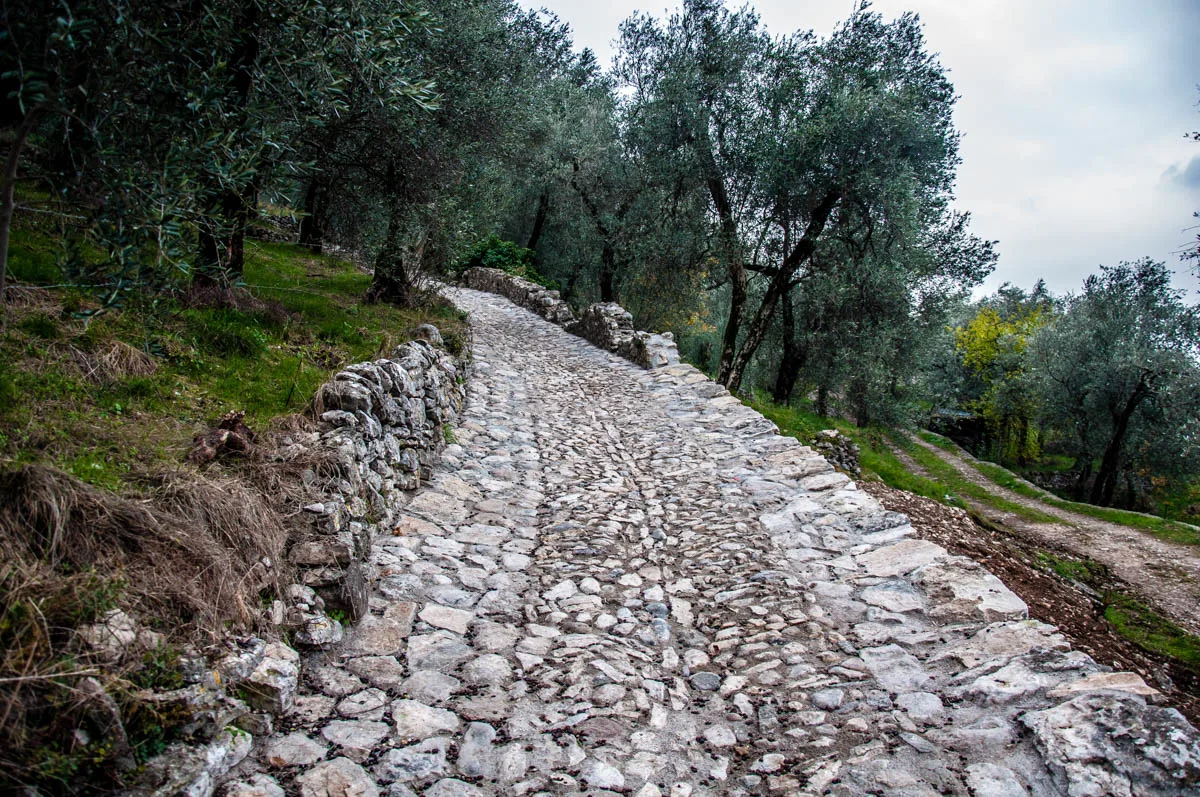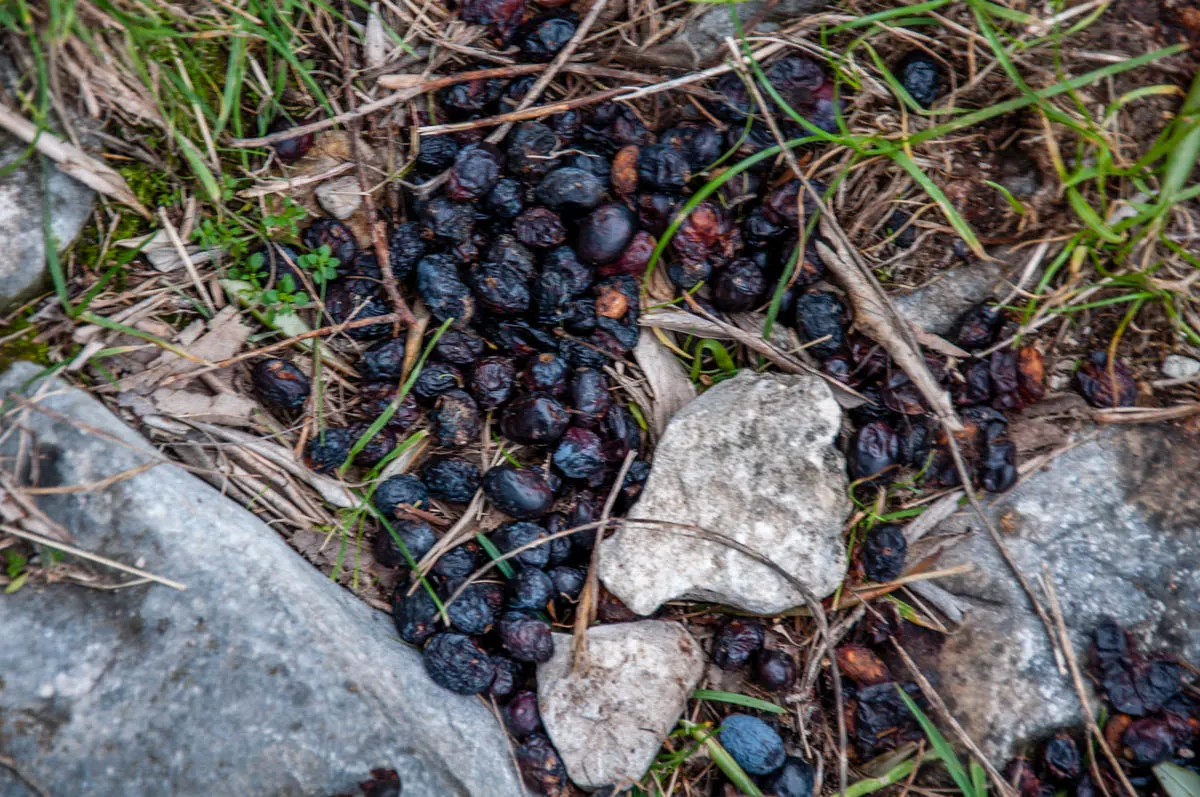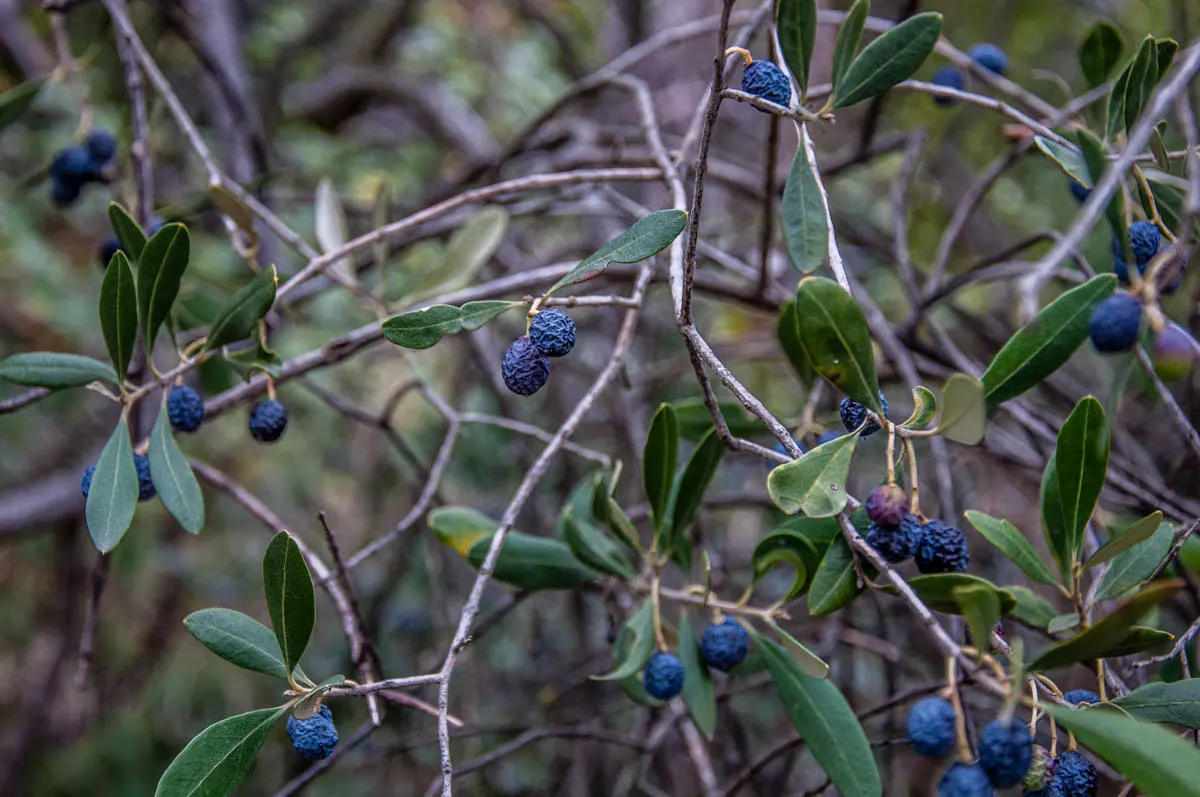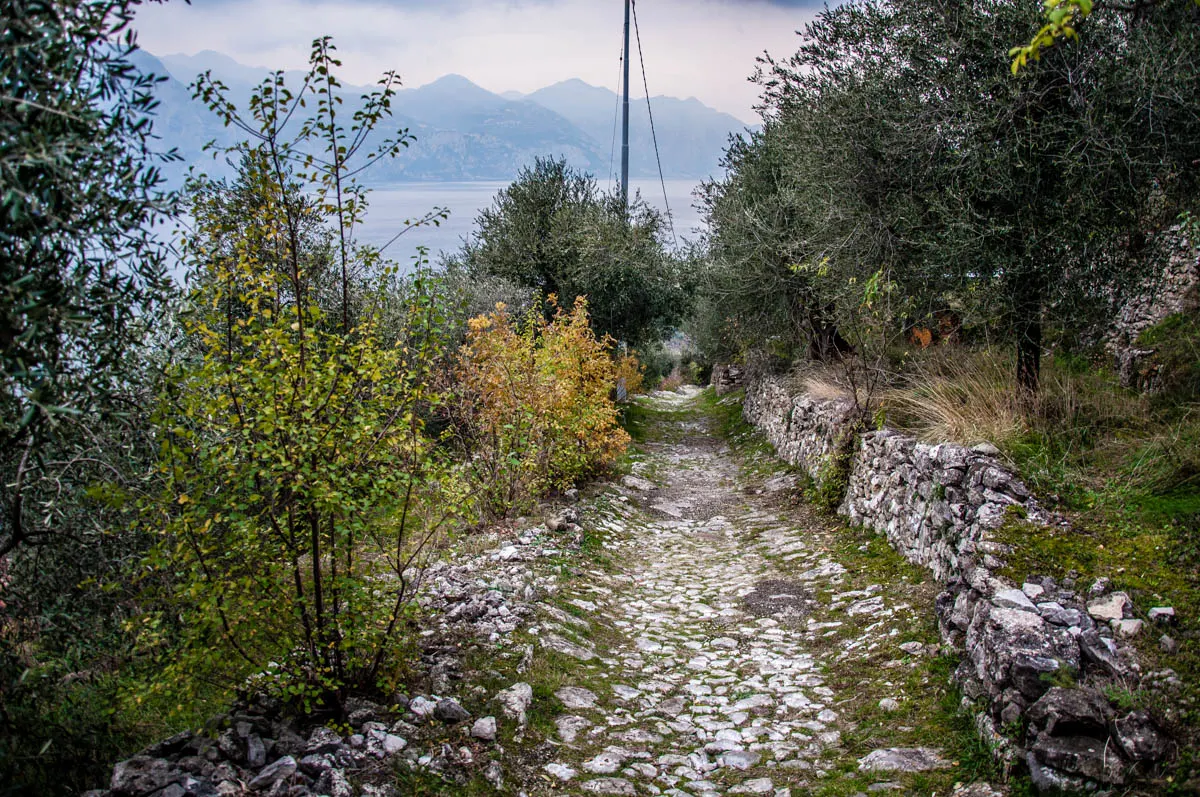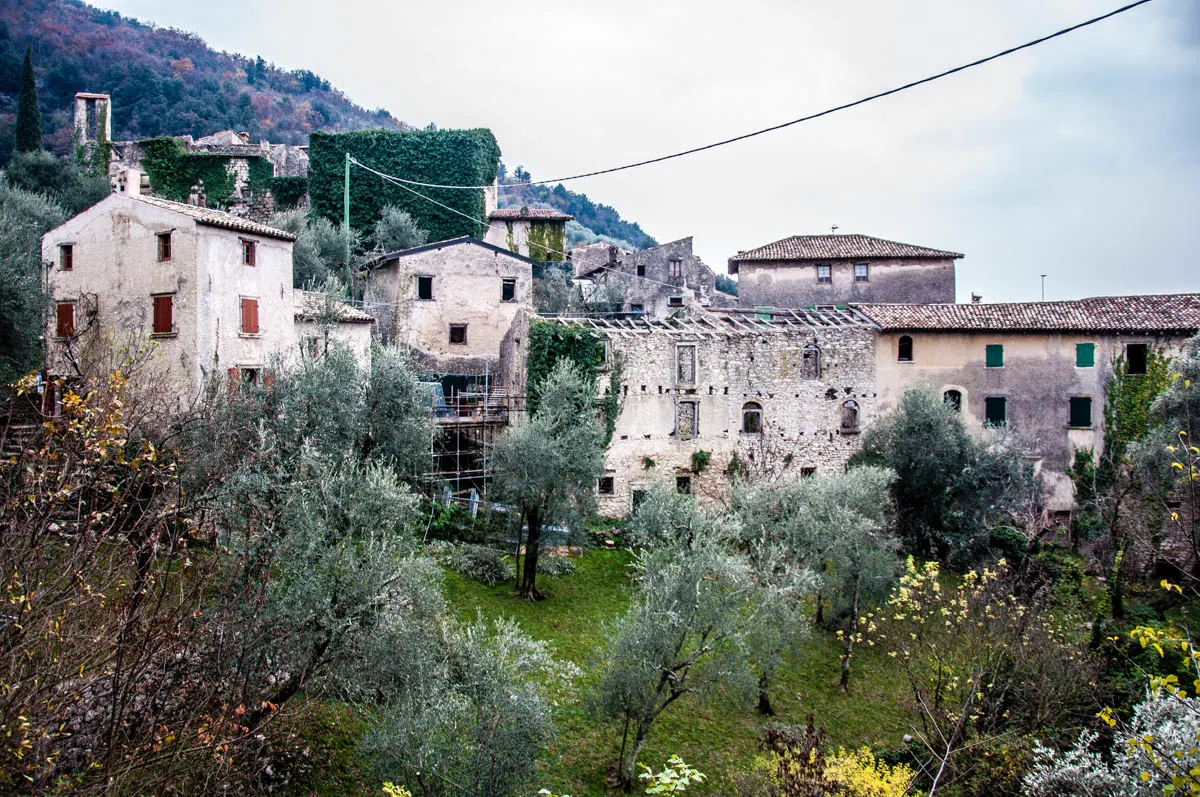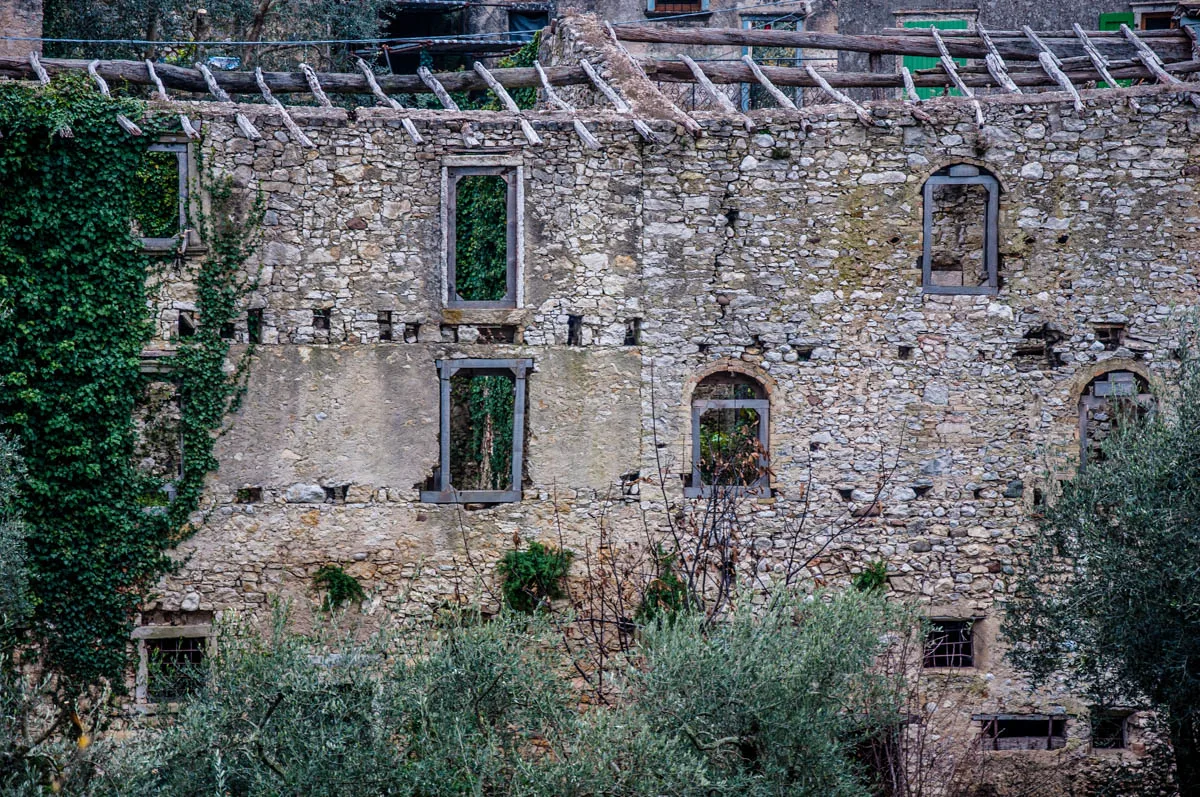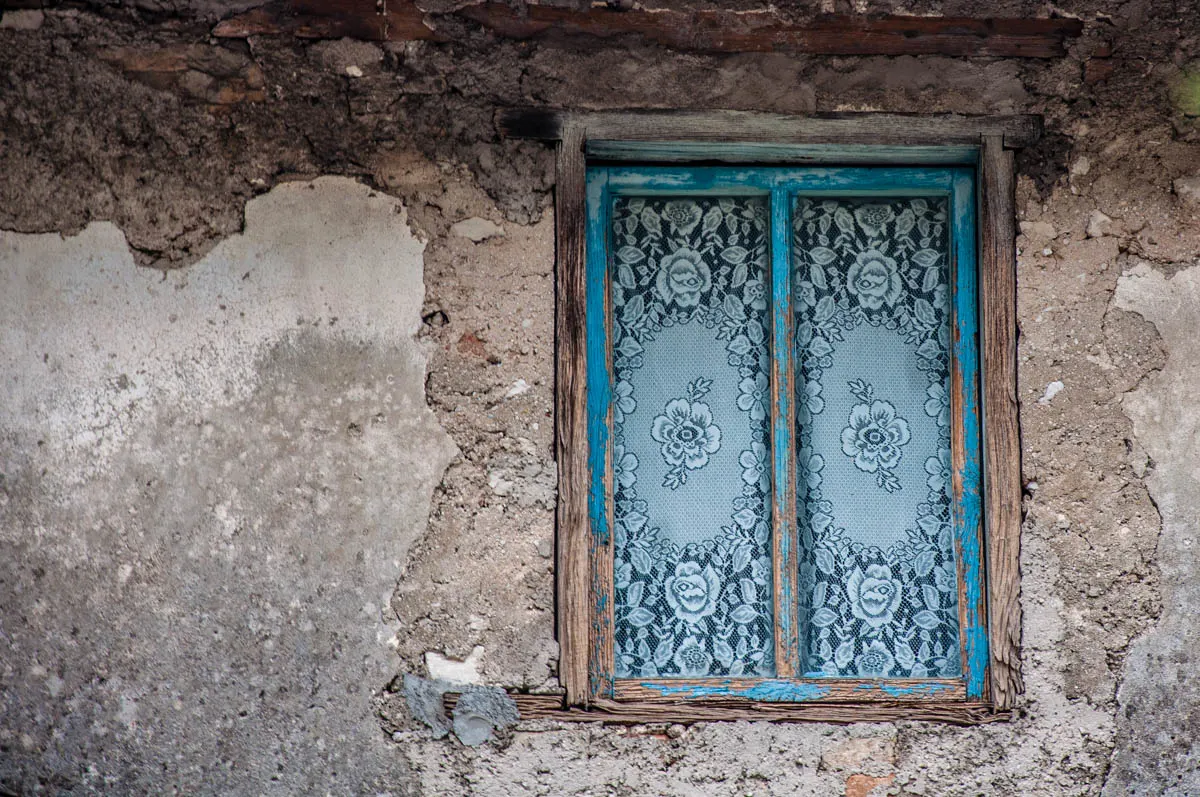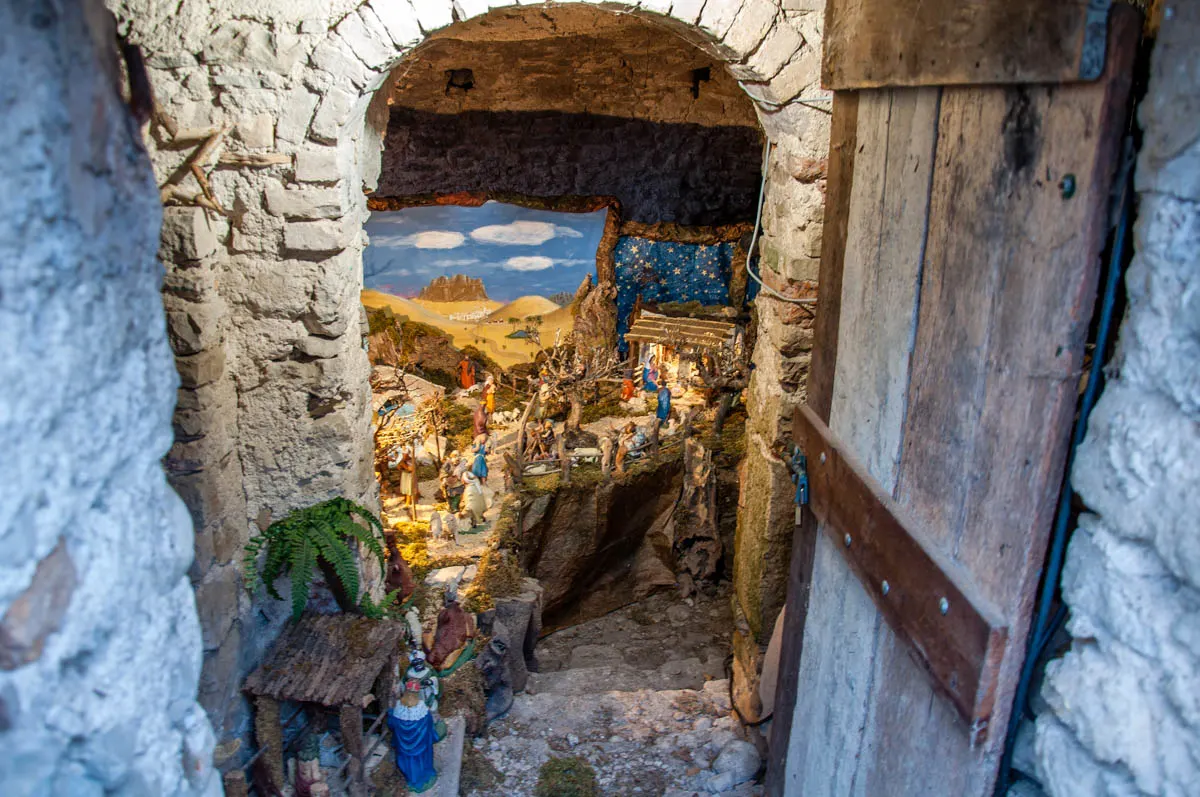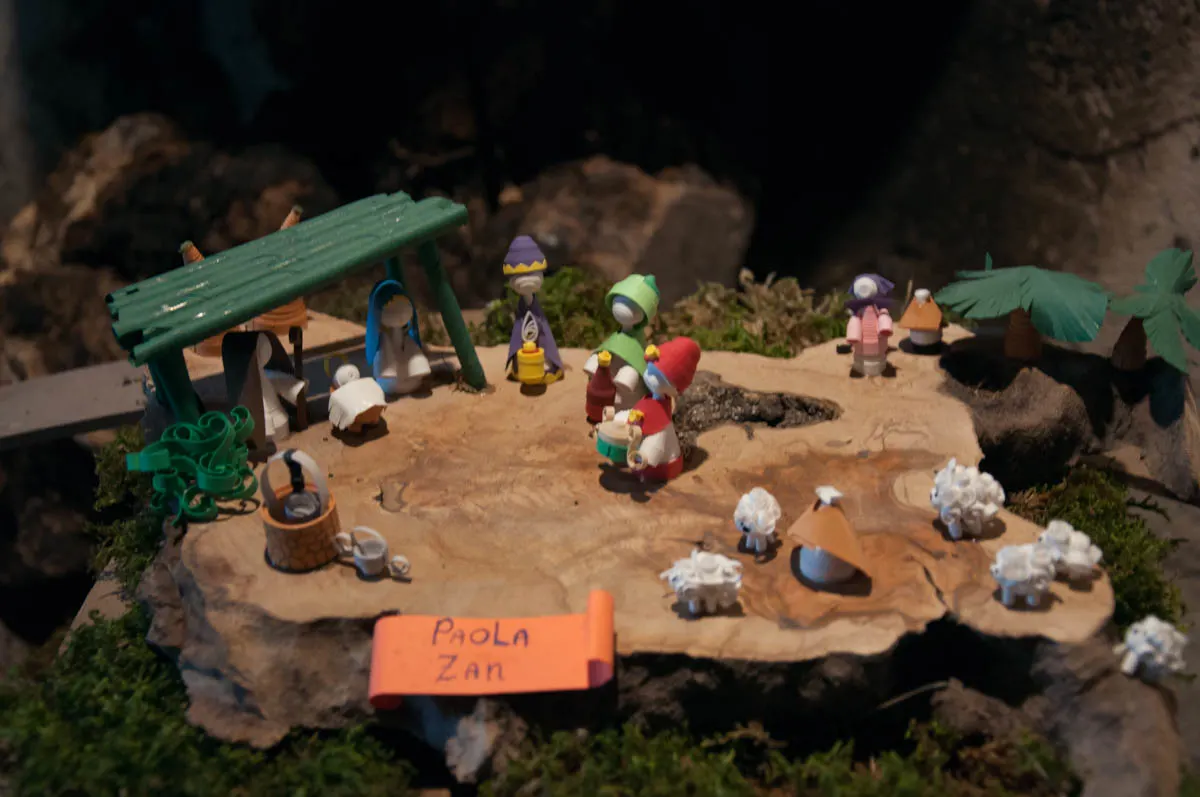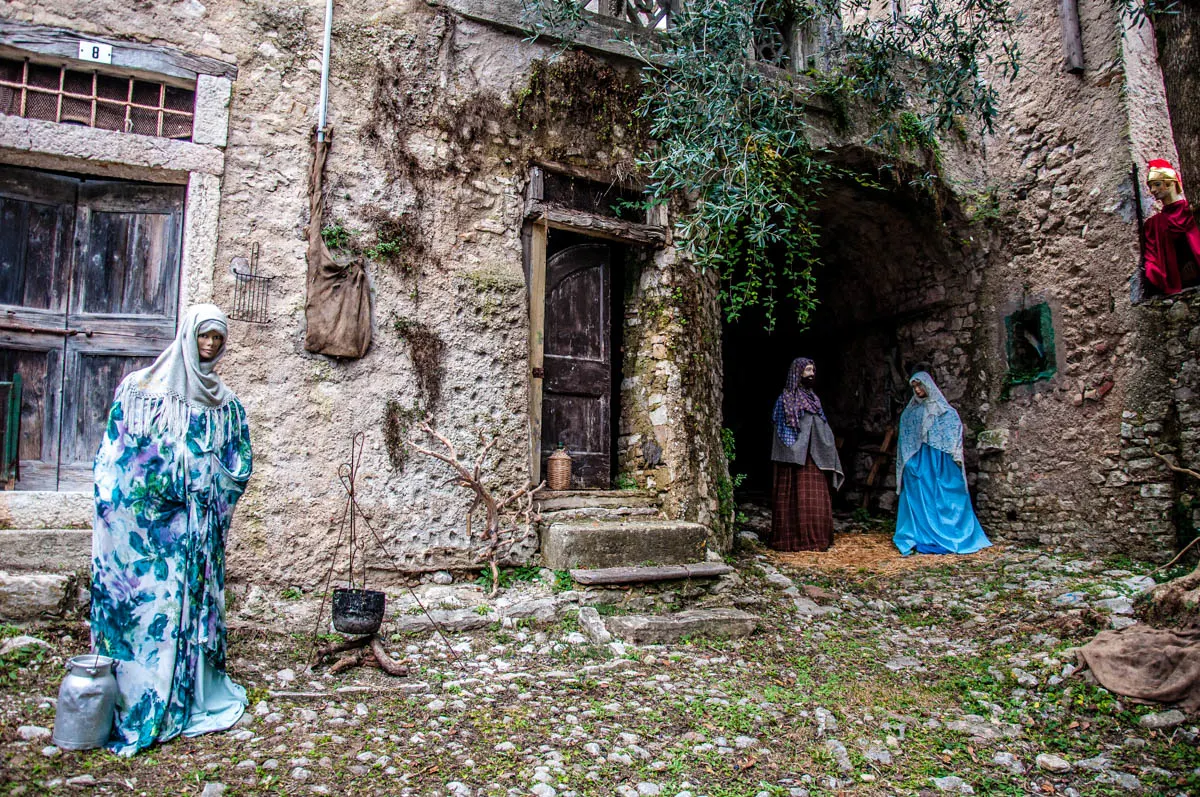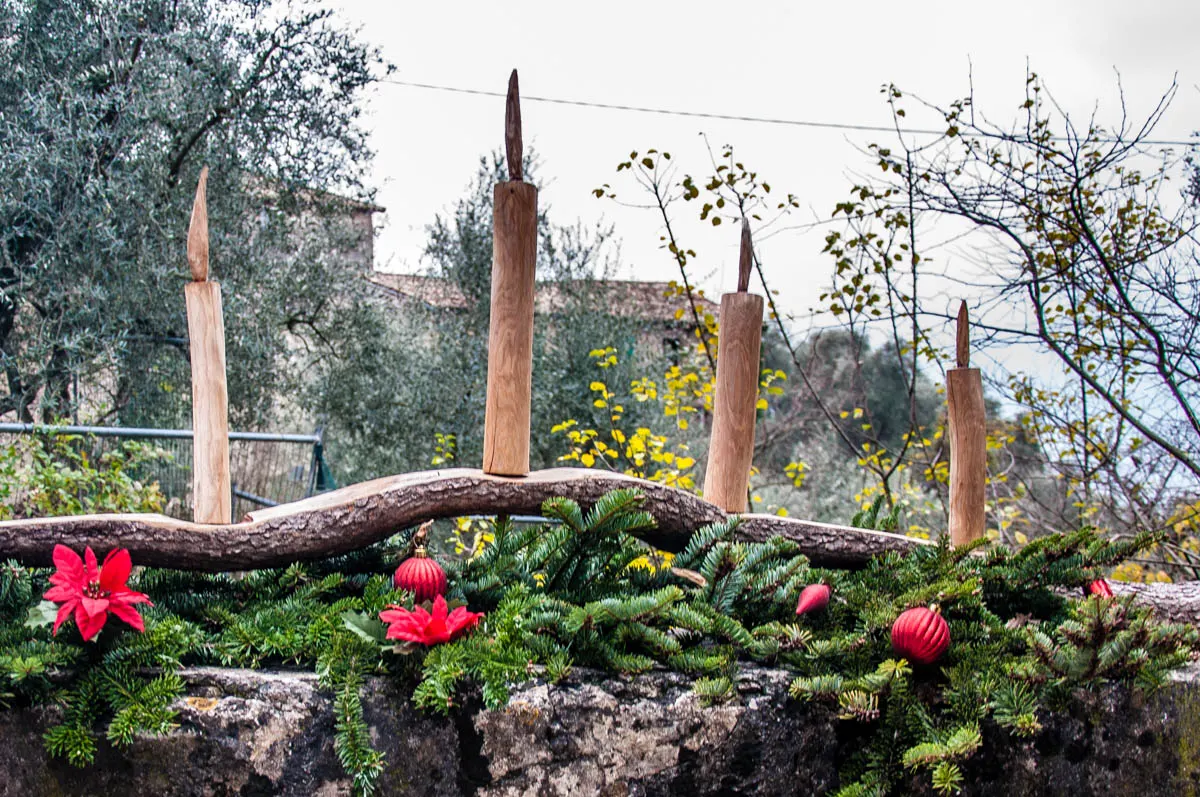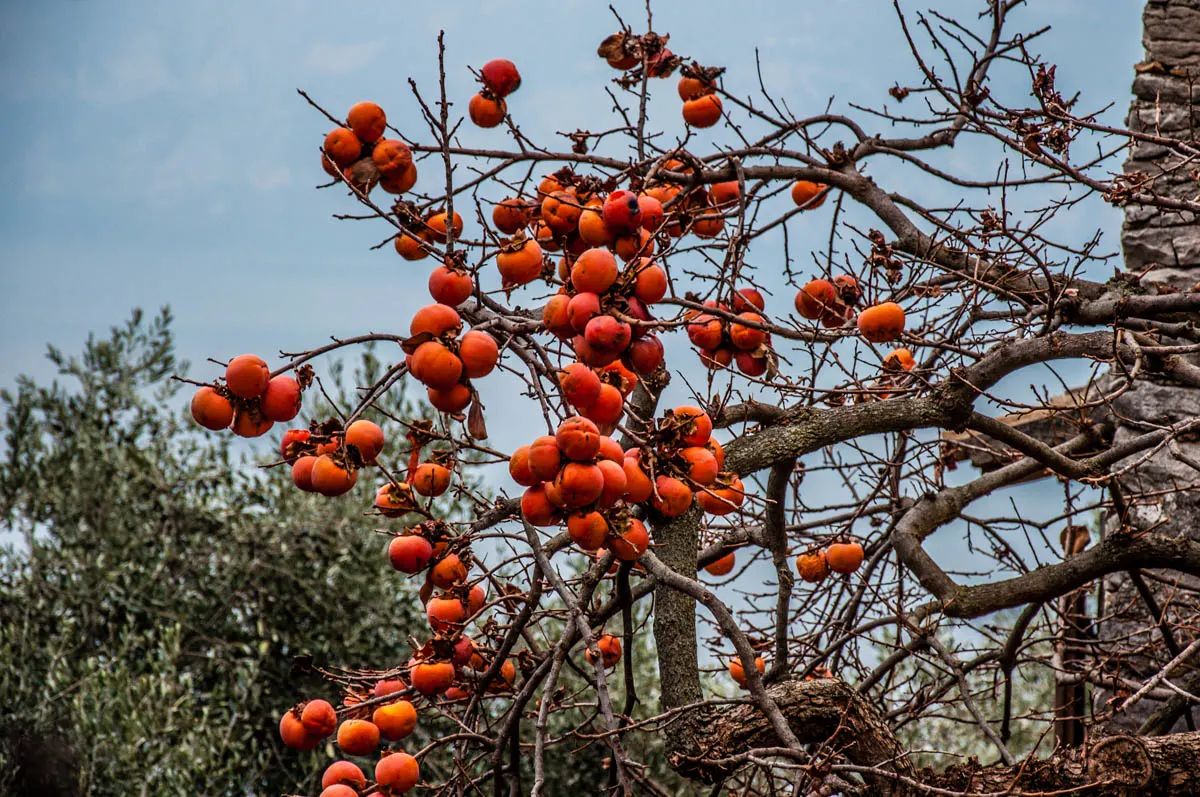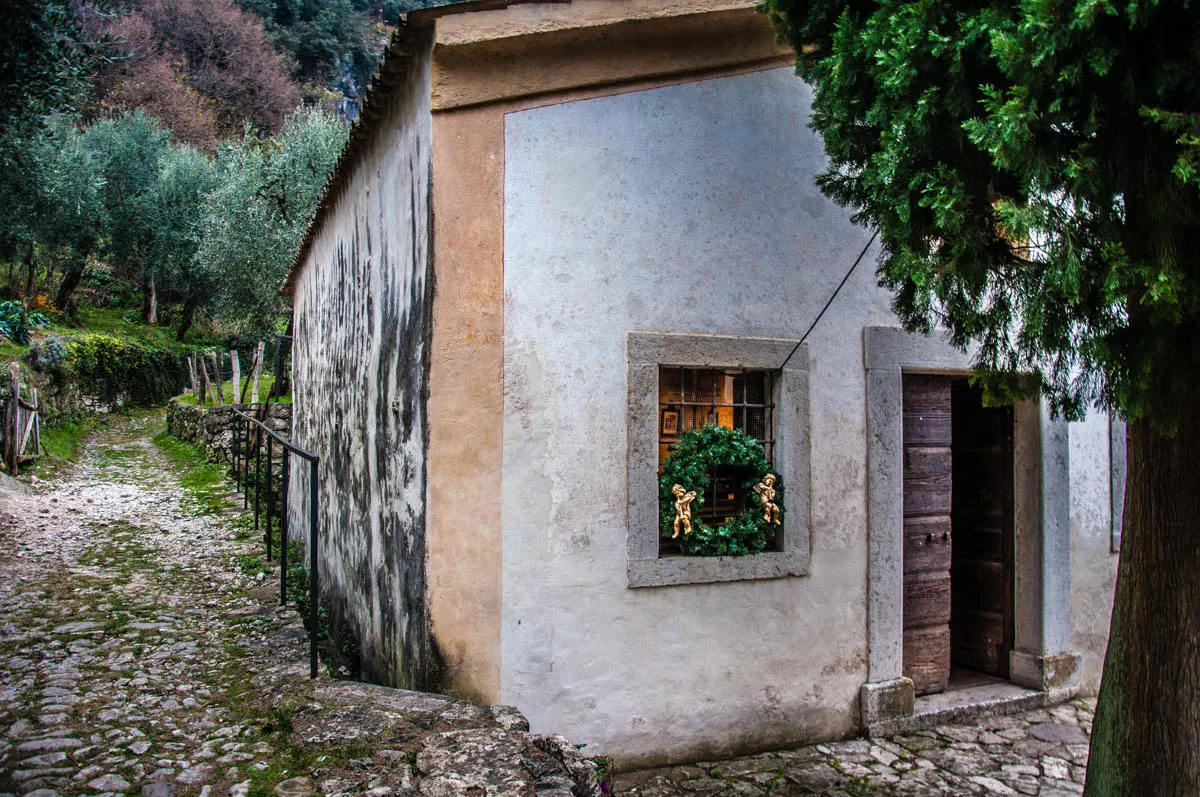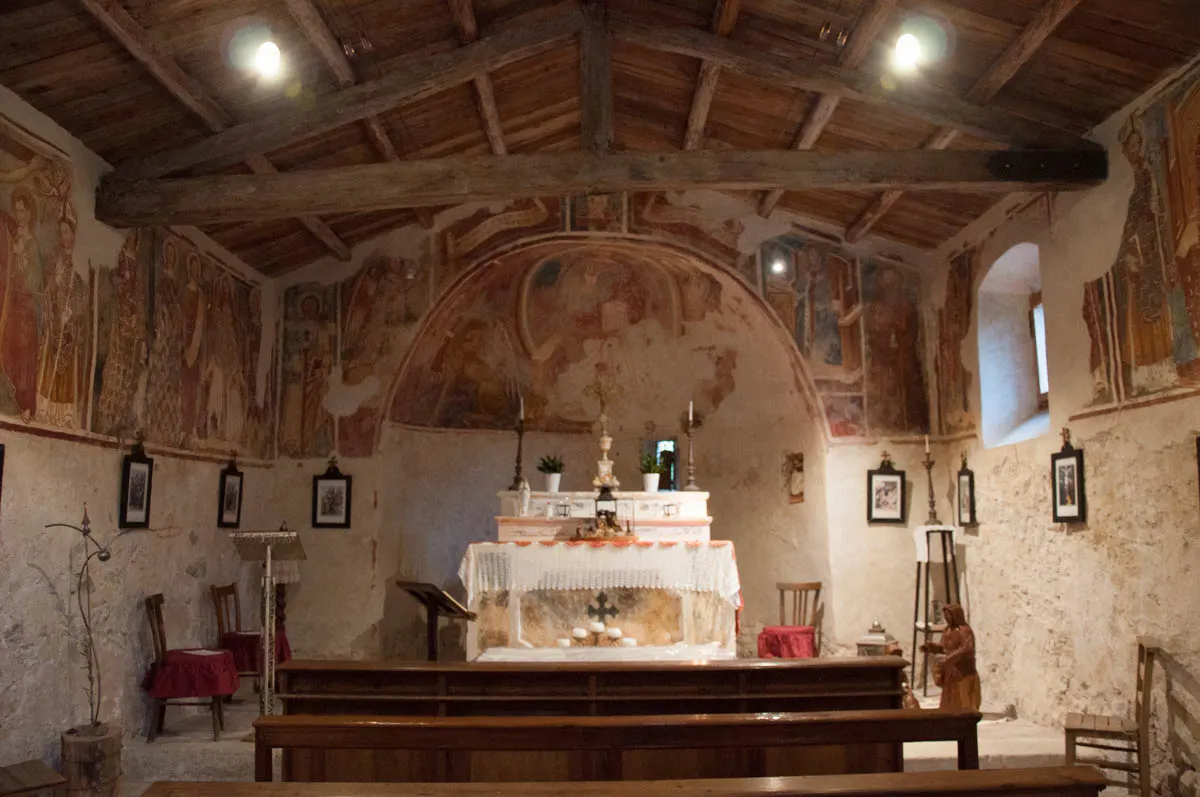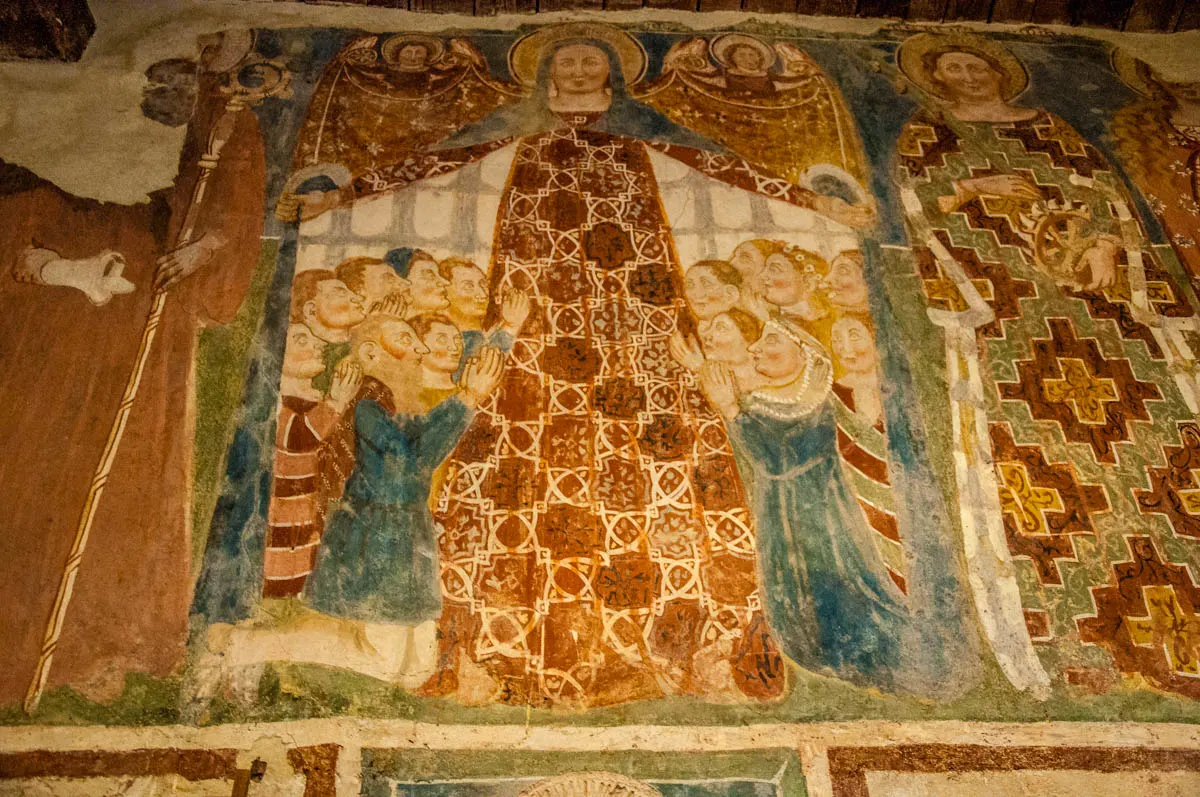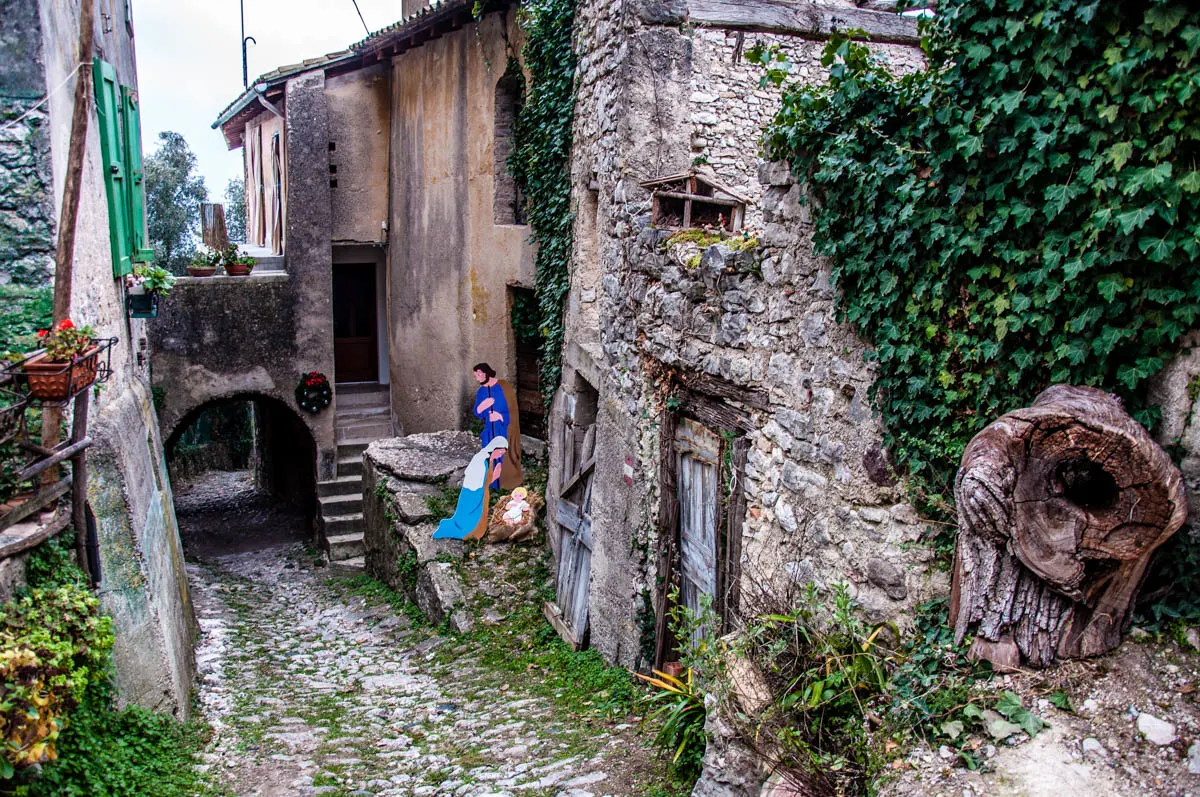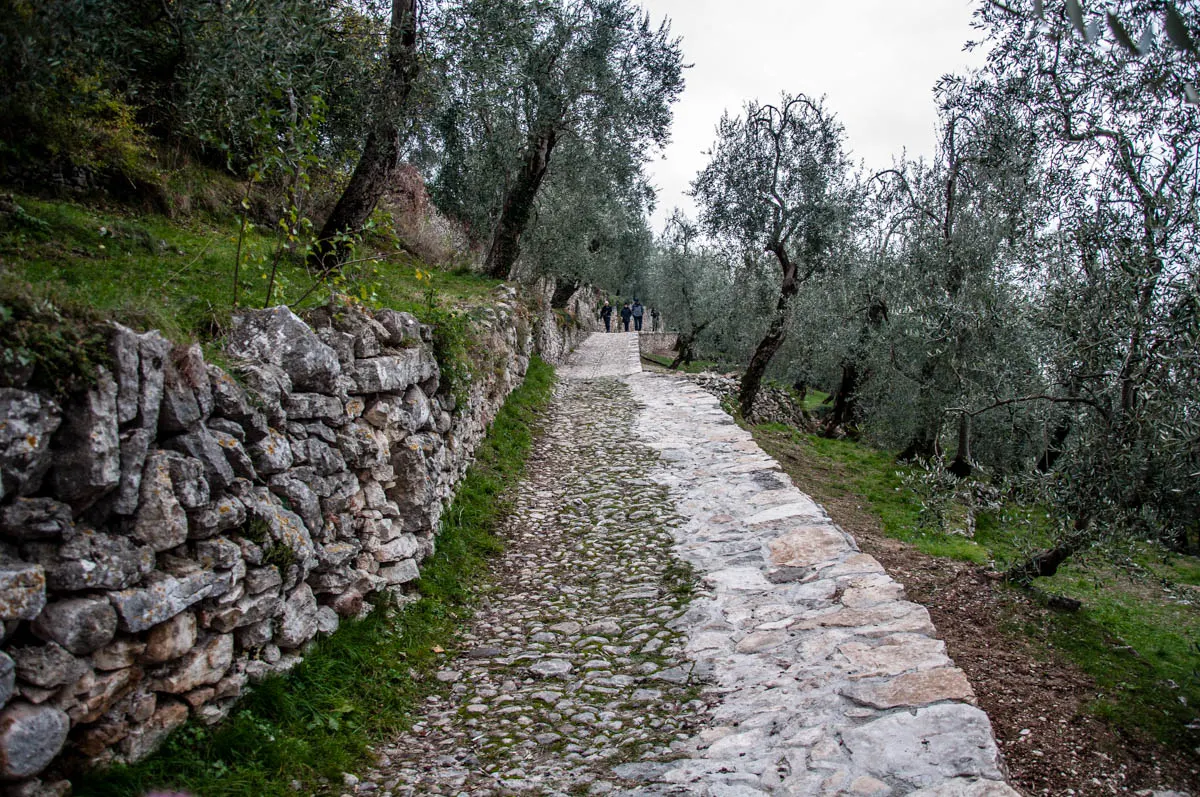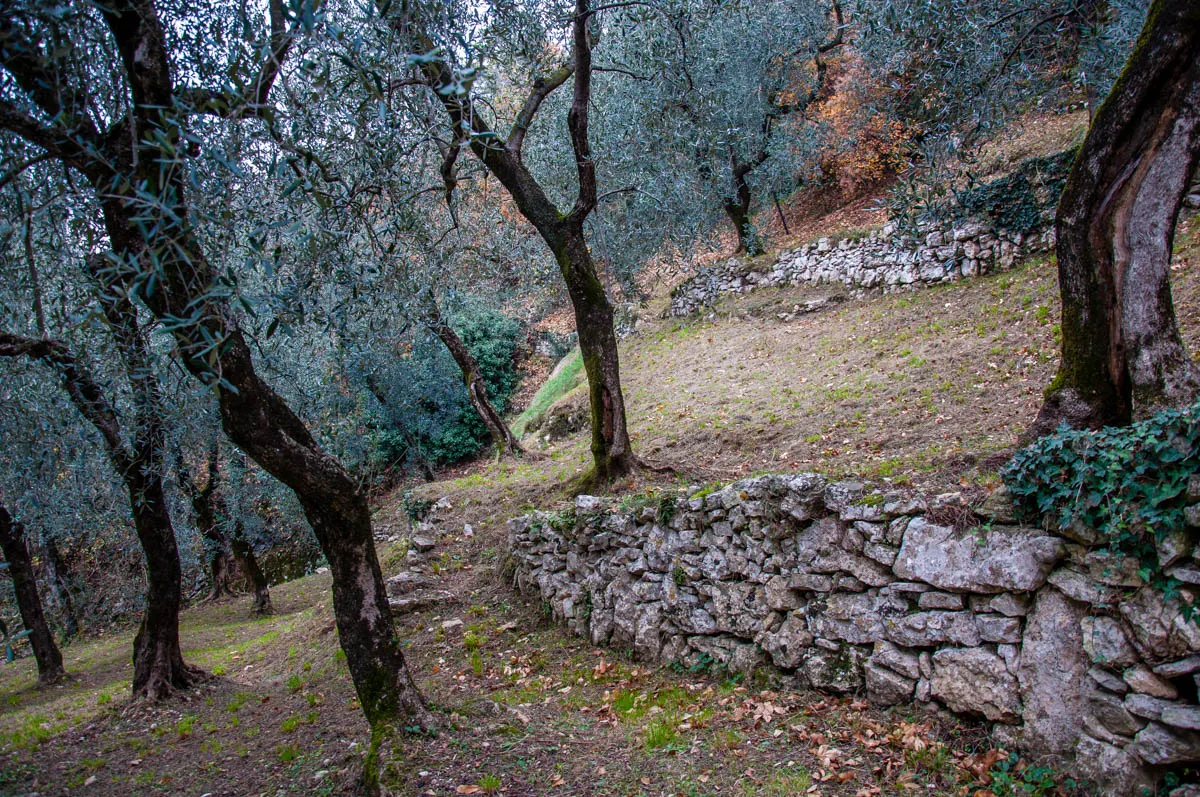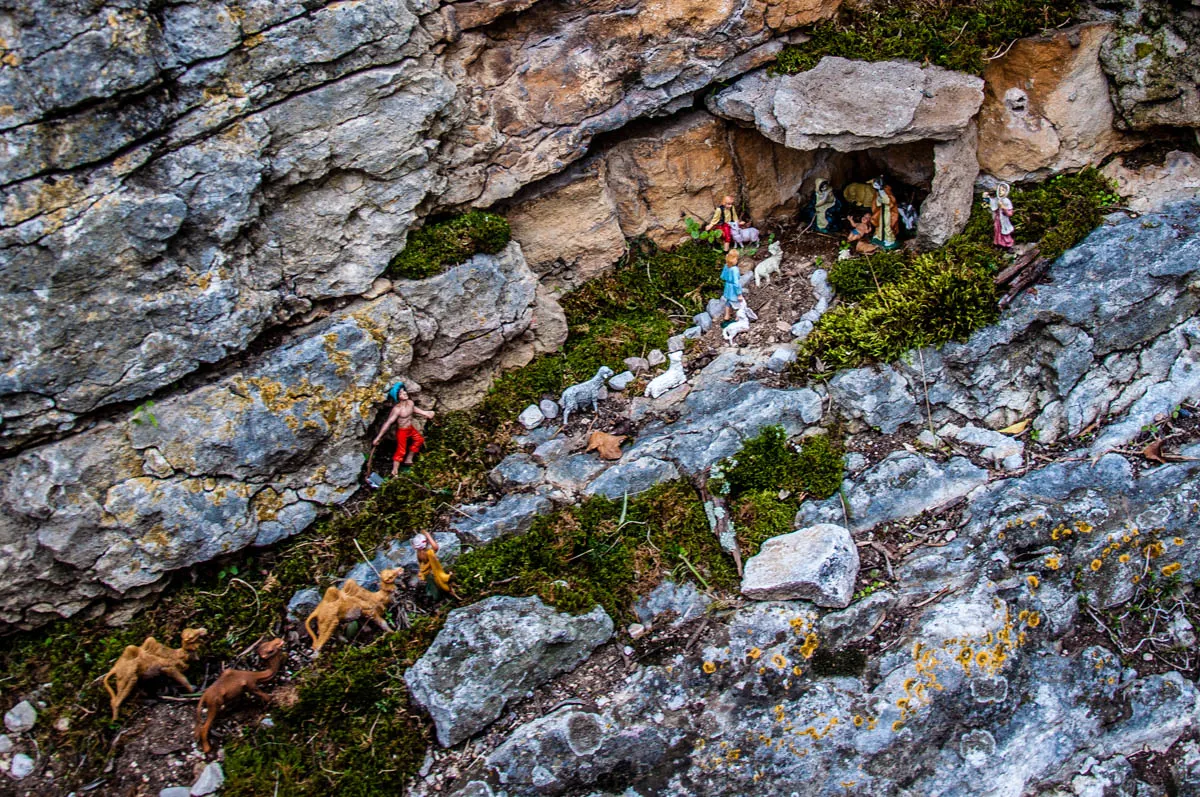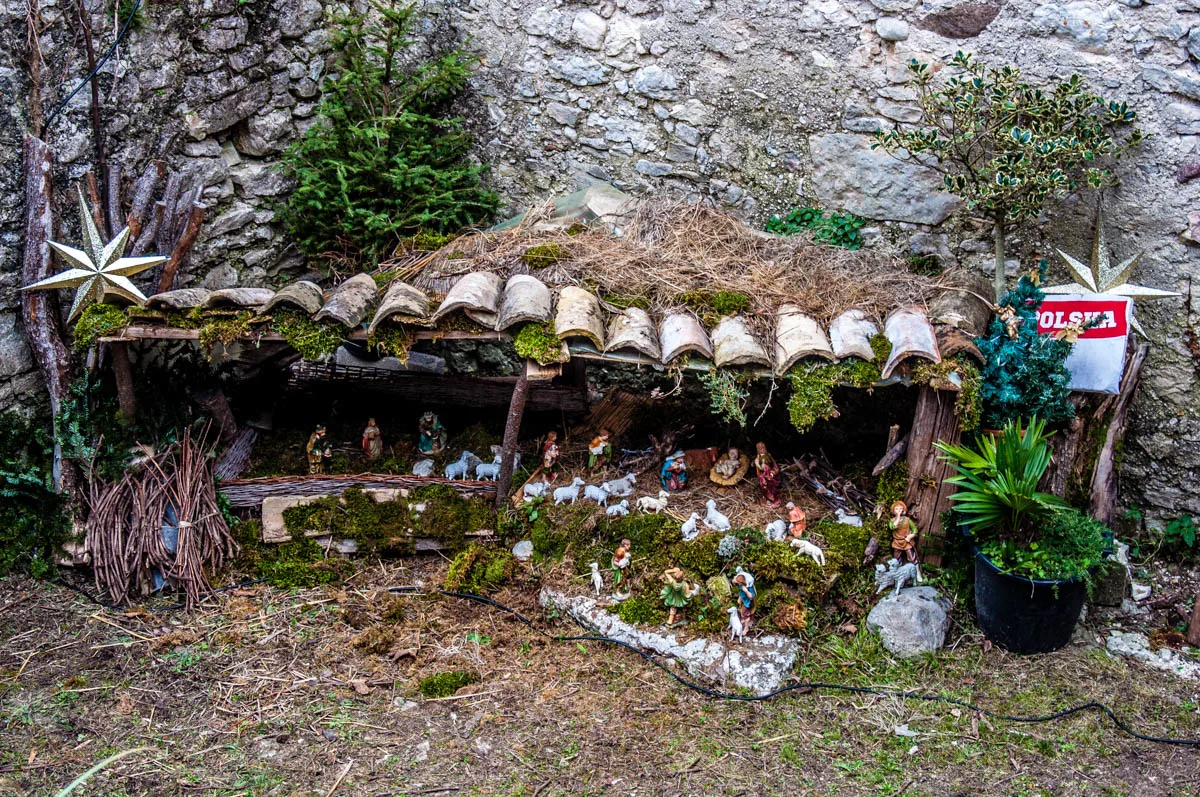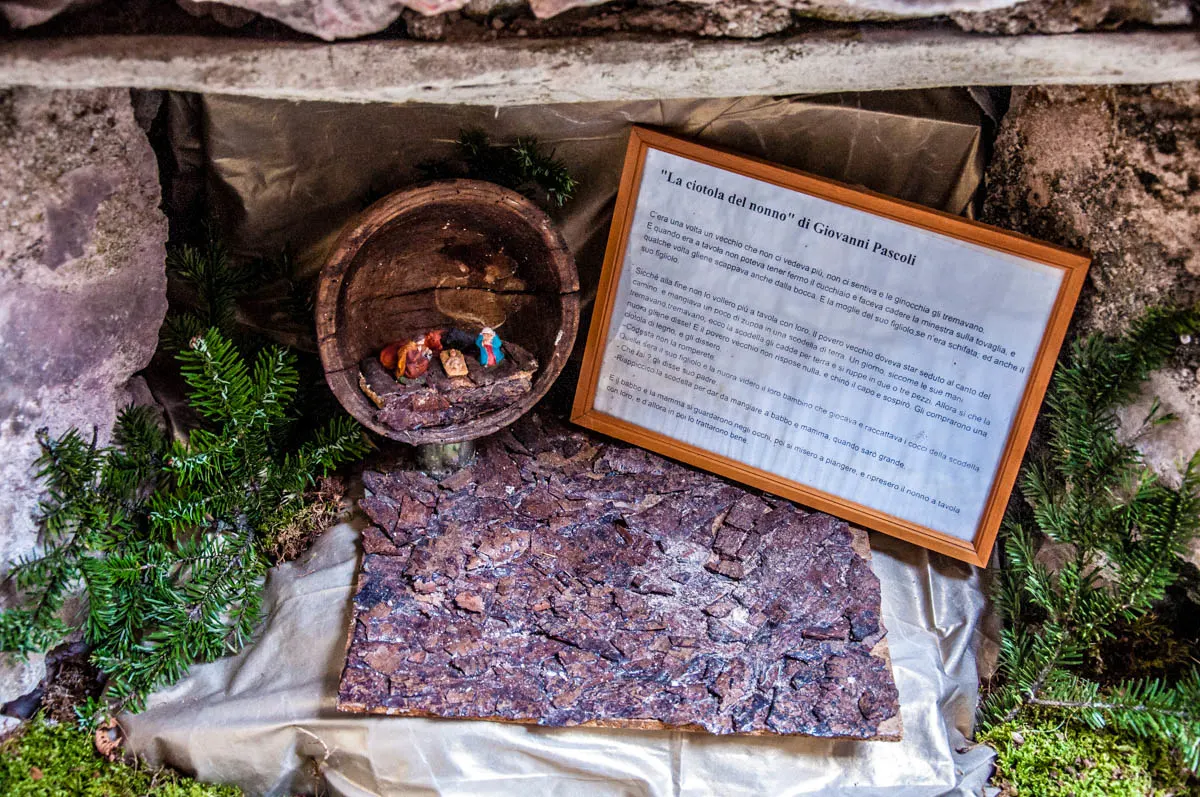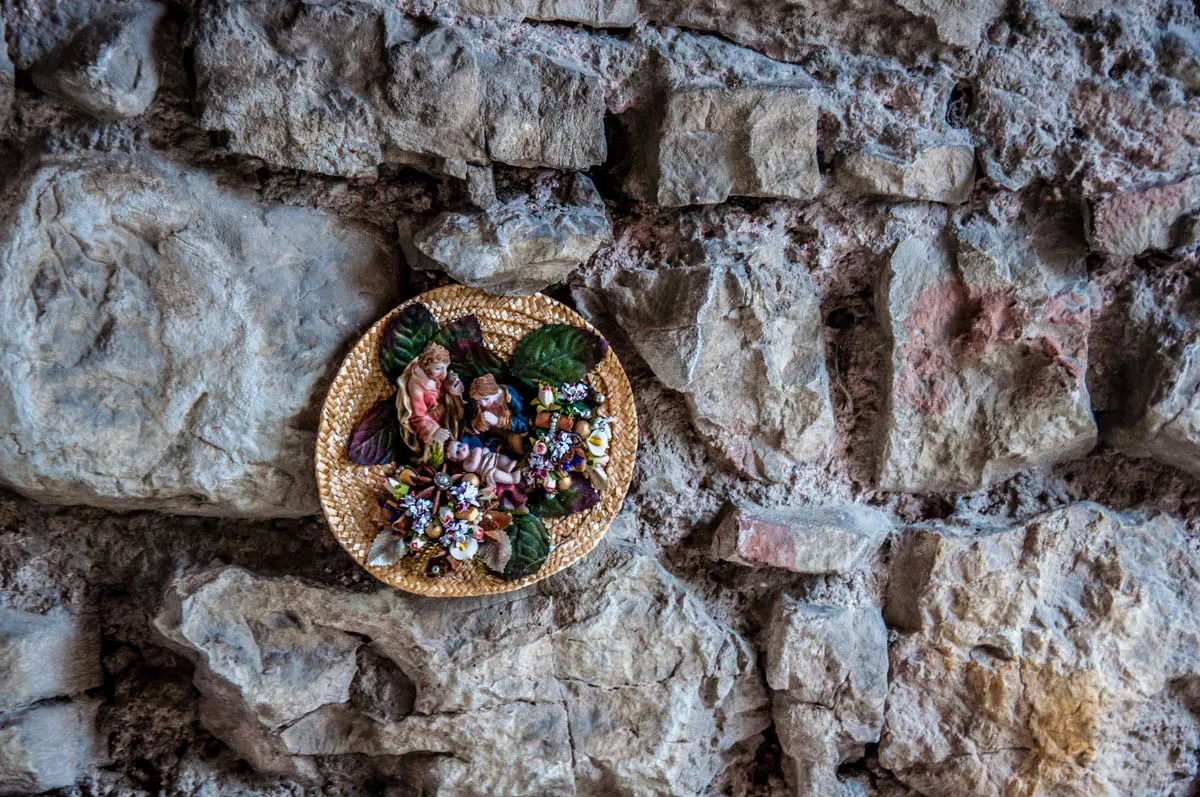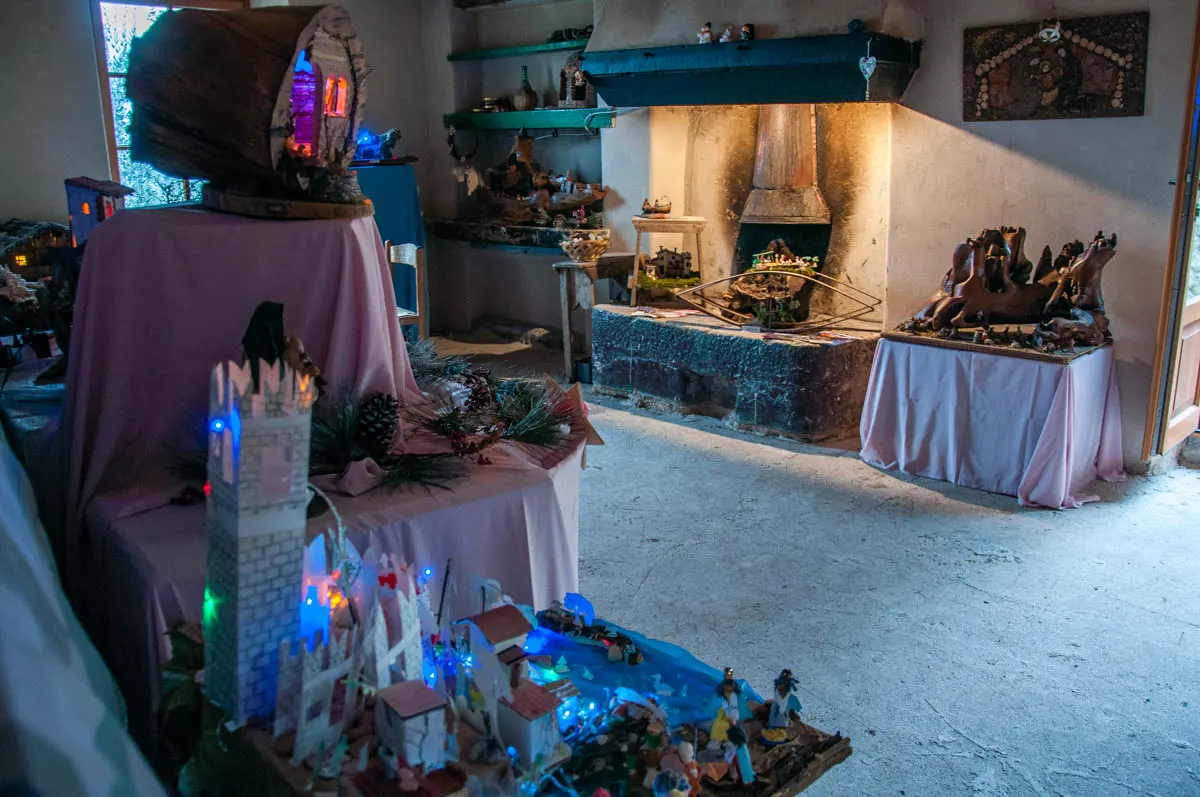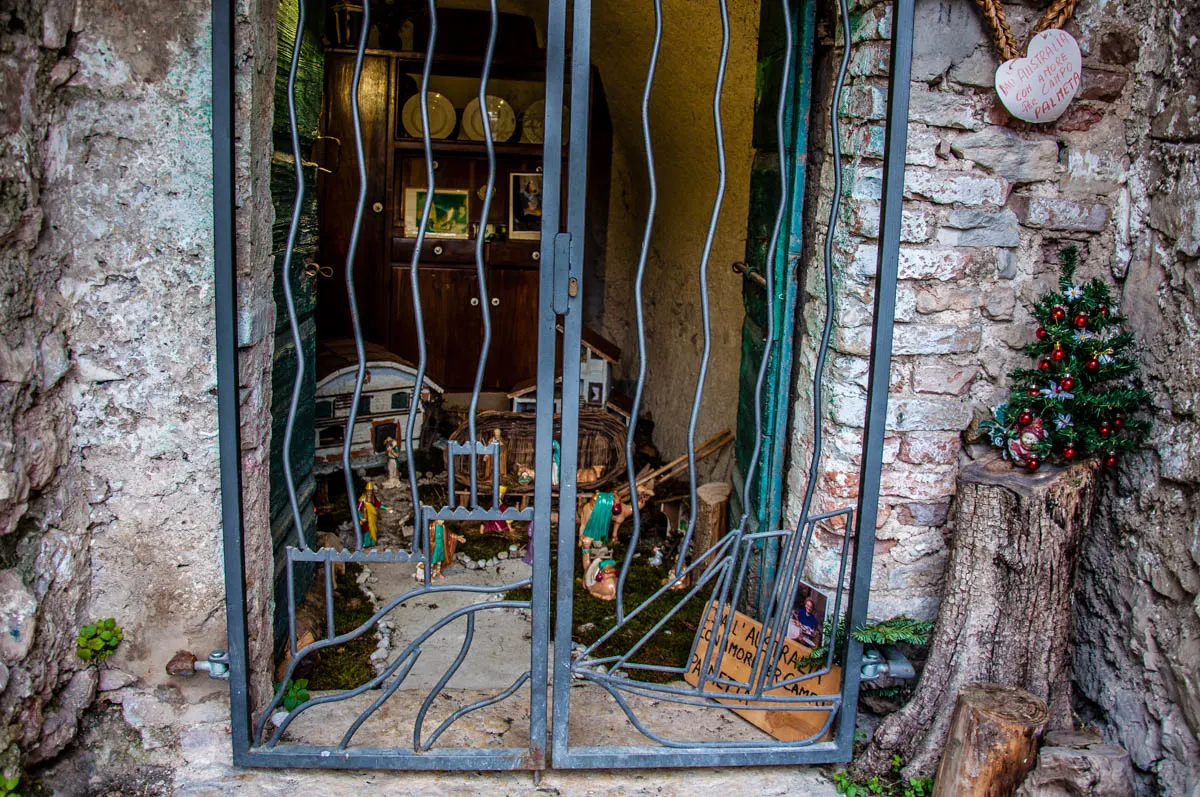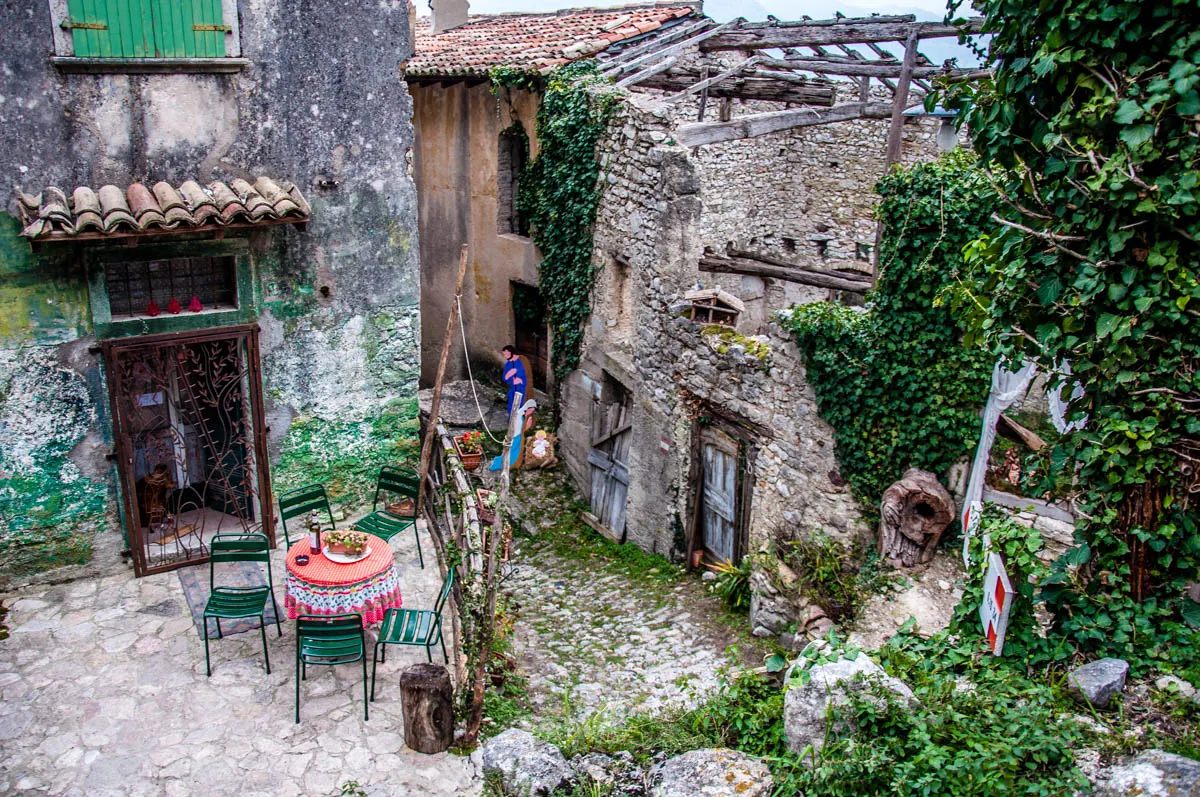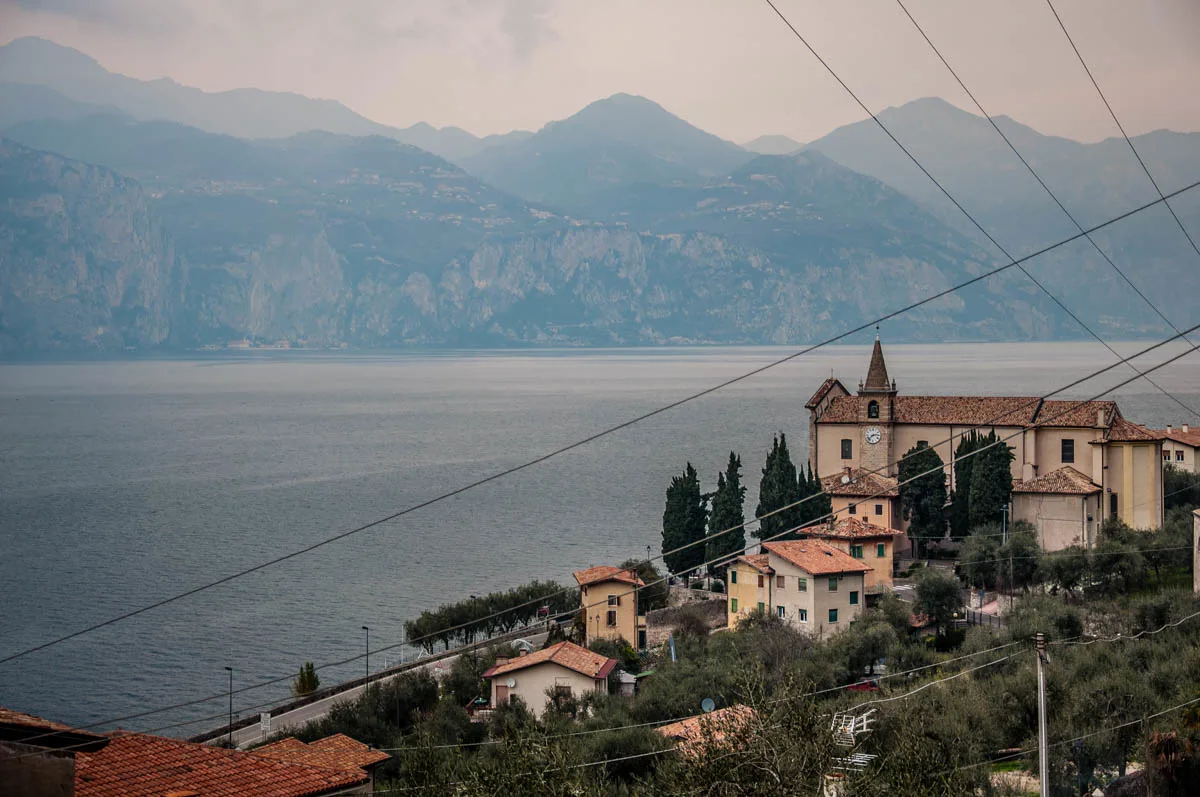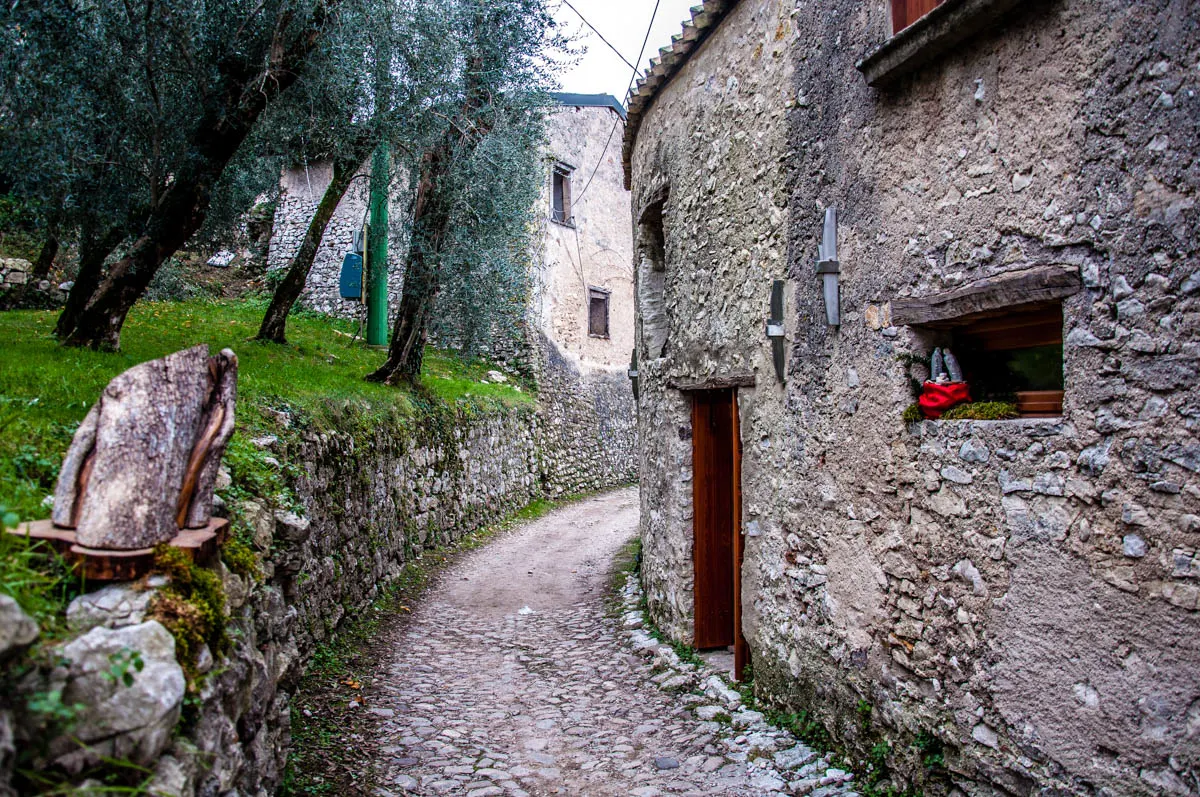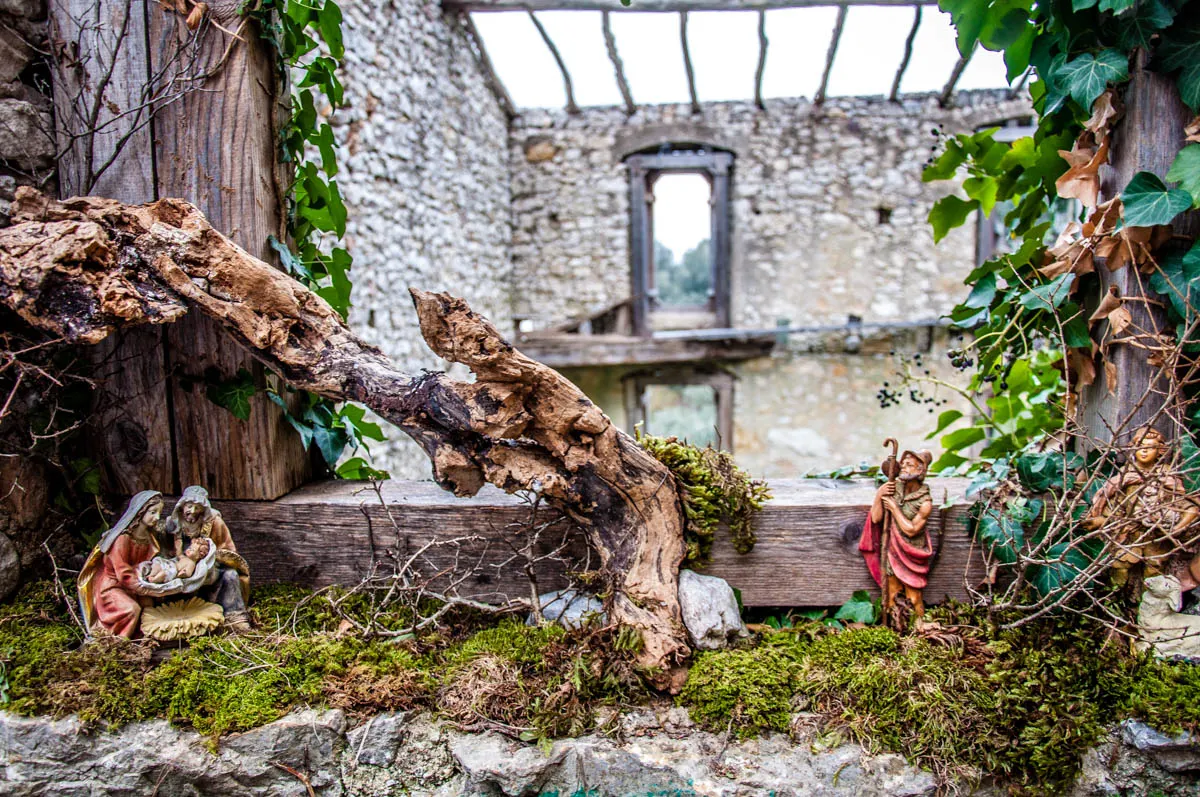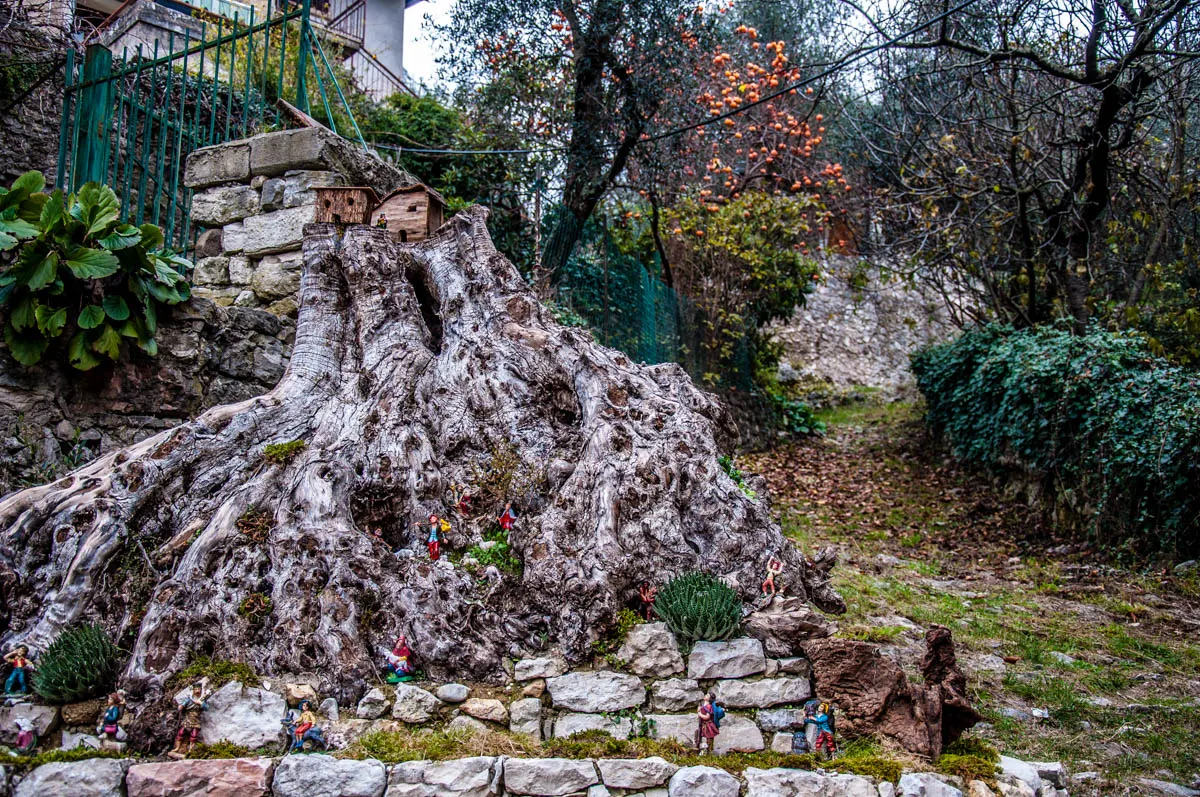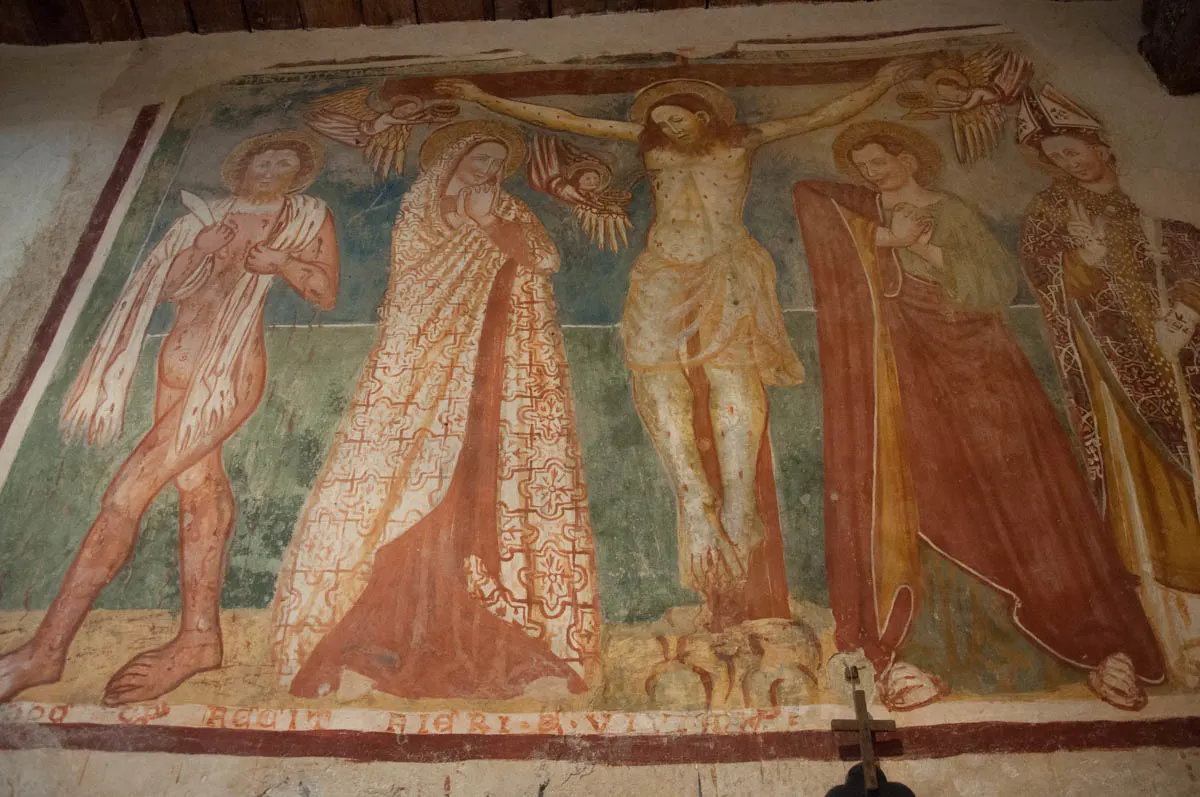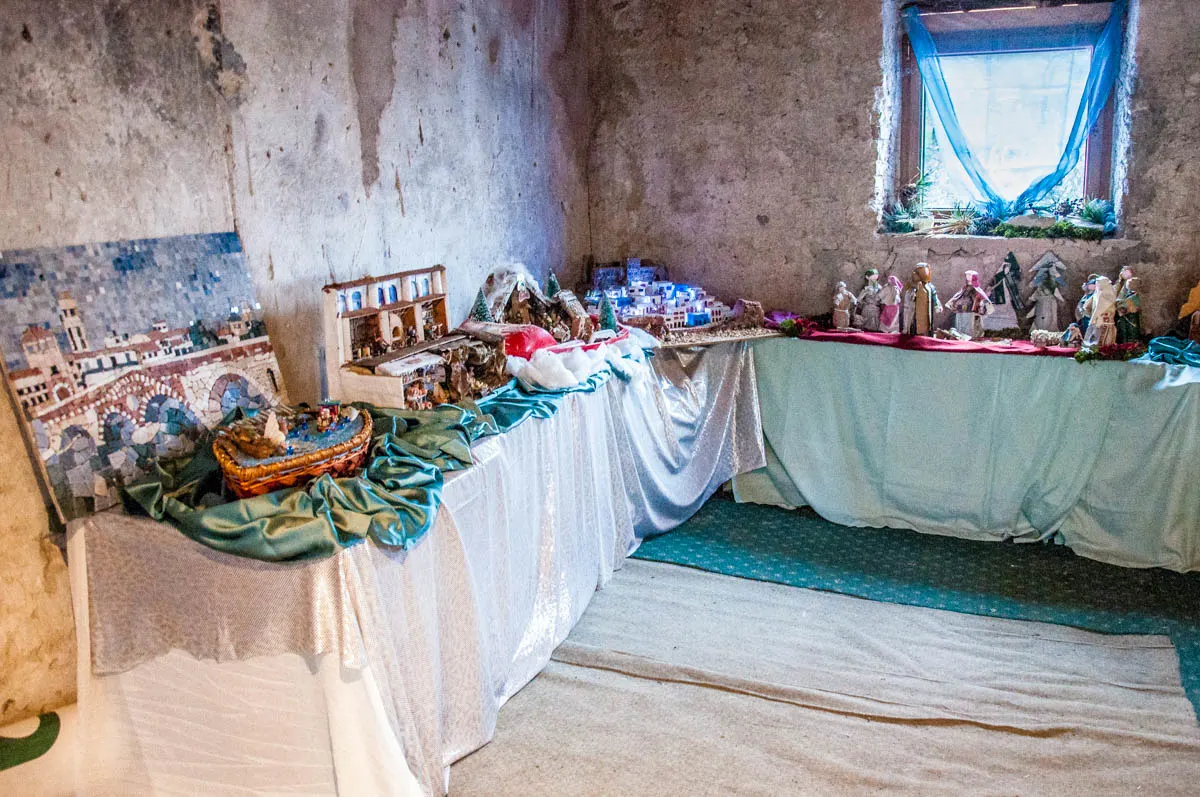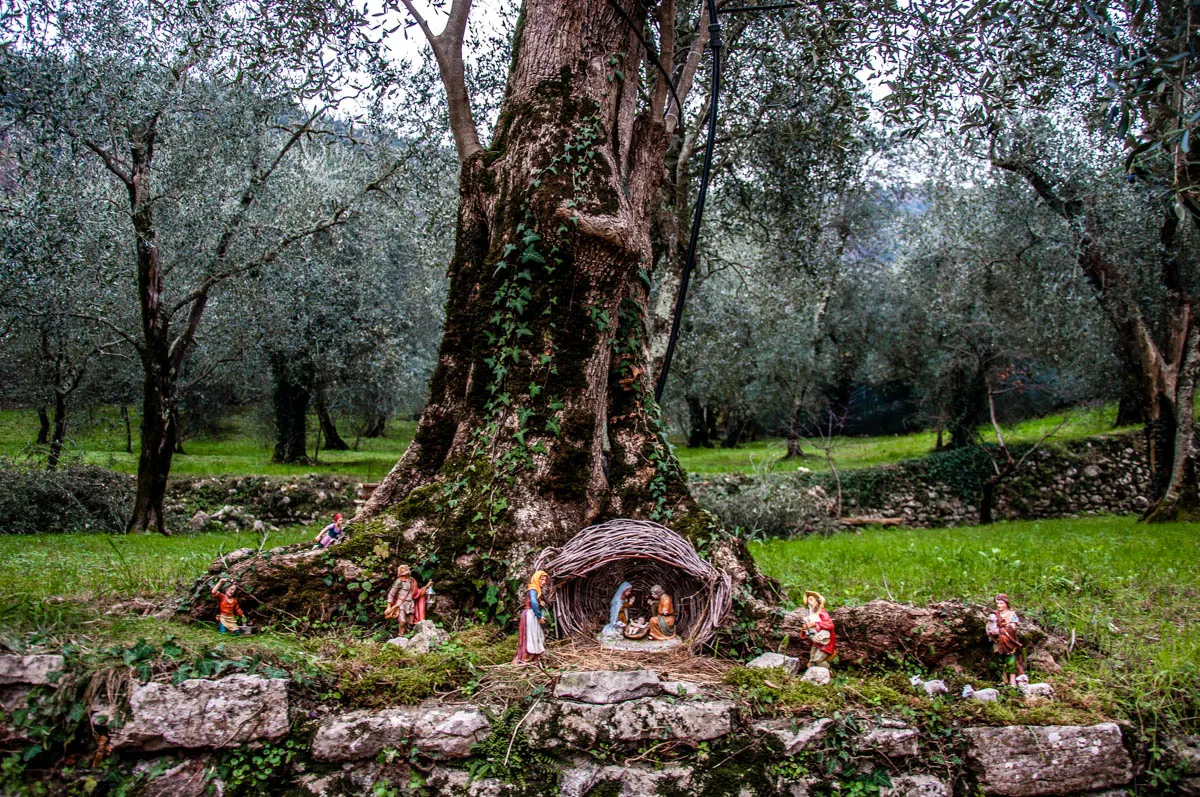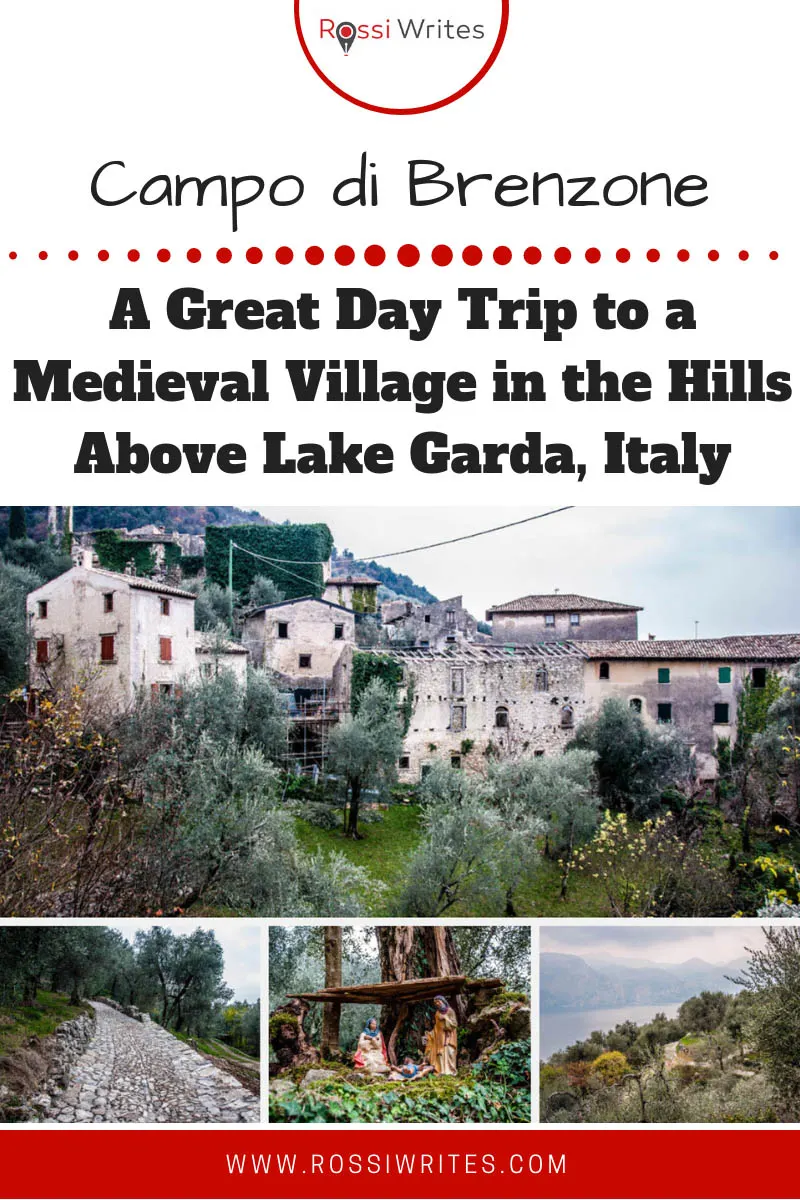Campo di Brenzone is an unforgettable destination for hikers and active day trippers in the steep hills which surround Lago di Garda – Italy’s largest lake.
A small medieval village of stone houses and cobbled paths, Campo di Brenzone can be reached following stone-paved mule tracks which meander upwards through terraced groves of lush olive trees. With a history that spans over ten centuries, nowadays, the village is almost entirely abandoned.
Only a handful of people continue living there. With most houses missing a rooftop or a wall and with no running water and central heating, you can say that the amenities are not quite up to speed with our modern times. Yet, the peaceful surroundings and the sprawling lake views that you can glimpse through the tree branches render Campo di Brenzone rather magical. It’s like a capsule preserving the good bygone times. Or a door that opens to a world that is no more.
If you are looking to experience Italy beyond the overcrowded cities and tourist cliches, Campo di Brenzone is the perfect destination. All you need is a free day (even half a day would do) and shoes with a good grip to support you on the paths leading you up on the face of the hill. For the brave at heart, you can also reach the medieval village by bike.
Further below I have provided all the information that you may need to make a visit to Campo di Brenzone happen. From travel directions to an abridged history of the village, I have included as many details and photos as possible to give you the full picture. Before we start with all this though, let me tell you about my personal visit to Campo di Brenzone – a place I had been wanting to see for a while.
A Visit to Campo di Brenzone Through My Eyes
Lake Garda is one of my most favourite places in Northern Italy. I love exploring the small picturesque towns dotted alongside its shores. I adore the gorgeous views – the blues of the crystal clear waters and the greens of the olive and citrus groves on the steep hills which hold the lake in their rugged embrace. And I am always interested to learn more about Lake Garda, its history and the traditions of the people who have called the land around it home for centuries.
So, when I randomly came across a mention of Campo di Brenzone – a quasi-abandoned medieval village overlooking Lake Garda – my curiosity was picked. I looked further into it and found out three tantalising details:
- Campo di Brenzone is one thousand years old. It was first mentioned in official documents in 1023!
- The village can be reached only on foot or by bike following centuries-old stone-paved mule tracks.
- Every year for the past ten years or so, Campo di Brenzone hosts a large exhibition of Nativity Scenes which are dotted all over its cobbled streets, in the roots of trees, in abandoned rooms of ancient stone houses and are even tucked in dry-stone walls.
As such, we earmarked a Sunday in December 2018 to try and visit Campo di Brenzone in order to add yet another adventure to our list of great experiences in Northern Italy.
An easy drive from Vicenza (where we live) to Marniga took us about an hour and thirty minutes tops. Marniga is a quiet village which is part of the municipality of Brenzone to which Campo di Brenzone also belongs. We managed to find a space to park in a small parking lot just behind the local playground. After asking a couple of locals for directions, we easily pinpointed the starting point of the trek to the medieval village – a steep cobbled street called Via San Piero.
The local people that we spoke to told us that the hike to Campo di Brenzone would take us about 20 mins. It took us just over double the time. As instead of walking purposefully and without any stops, we took it very easy. Plus, we often lingered to take photos and to enjoy the views opening in front of us. The path went up and up the hill curving here and there between terraced olive groves.
In places, handfuls of shrivelled olives covered the cobbles on which we gingerly stepped.
Looking up we could see dry and rugged black olives still hanging from the branches above our heads.
We speculated how difficult it must be to pick the olives on those hills. Due to the steep elevation of the slope, it must be very difficult, we thought, to get any sort of machinery up there.
Further up the track, we actually came across a small tractor parked in a shed. We stopped for a bit and wondered yet again how heart-stopping it must be to drive a tractor on the narrow terraces overlooking the lake below.
Just then a local man flew past us riding his electric mountain bike which (to my utter surprise!) didn’t have a saddle. We admired the rider’s ability to navigate the steep mule tracks paved with centuries-old irregular jagged stones.
After several curves and steep portions of the path, we finally glimpsed the stone houses of Campo di Brenzone.
As recently as seventy years ago, over fifteen families were living there maintaining a centuries-old way of life between the olive groves. Then hardship and poverty led the locals to emigrate all over the world. Nowadays, only a handful of elderly people remain in the picturesque village.
We were met by the empty windows of Campo di Brenzone. Large houses stood in ruins. Whole rooftops and walls had fallen down under the heavy weight of the passing time. The scene perfectly justified Campo di Brenzone’s moniker in Italian – il borgo fantasma.
The Ghost Hamlet!
There was nothing scary about Campo di Brenzone though. Instead, there was something very poetic about it. A type of beauty which prevails even in ruins. The faded blue of chipped window frames, the lacy curtains, the iron gates of the local Taverna Olga, the gaggle of chairs left outside for the visitors to sit on and chat. It all spoke of prevailing love and care even when the physical strength to maintain things whole is no longer there.
A careful hand (or many) had placed dozens and dozens of artisan Nativity Scenes all over the village. Varying in size from tiny Christmas compositions representing the Holy Family in the stables to large recreations of wood and paper of the whole town of Bethelem, the Nativity Scenes had taken over gaps between the roots of mighty olive trees, whole rooms in abandoned houses and large cobbled front yards.
Fifty people or so – hikers and tourists from the nearby towns and villages – were walking just like us through Campo di Brenzone’s streets trying to spot as many Nativity Scenes as possible.
Nativity scenes are the focus of the Christmas decorations and the Christmas spirit in Italy. Also known as a manger scene or a crib in English, they are called presepio or presepe in Italian and are carefully arranged in churches, city squares and private homes all over the country.
Using Campo di Brenzone as a natural setting for Nativity Scenes made by artists, schoolchildren and artisans is an original way to attract the attention to the medieval village and to keep it at the forefront of people’s minds. This way Campo di Brenzone’s legacy will not be reduced to a pile of soul-less houses in ruins. You can still feel the Christmas spirit in it and imagine the life that people have lived there for centuries.
Persimmon trees dripping with large orange fruits caught my eye as we were walking through Campo di Brenzone in our treasure hunt for more and yet more Nativity Scenes. The biggest surprise awaited me right at the other end of the village though.
There stood a small, humble church.
Called San Pietro in Vincoli (St. Peter in Chains), its history goes back to the 12th-14th centuries.
Inside the church, there is a stunning cycle of frescos, completed in 1358 by the master painter Giorgio da Riva. I fell in love with the bright colours and the bold patterns of the clothes that the different saints were depicted in.
It was an unexpected discovery for me in the midst of the hills above Lake Garda and a reason to make me wish to return to Campo di Brenzone time and time again to learn more about it and hear its stories.
Campo di Brenzone – History and Traditions
Documents held in the archive of the Monastery of St. Zeno in Verona testify that Campo di Brenzone existed as far back as 1023. It is a small hamlet of stone houses on the steep slopes of the alpine range Monte Baldo which overlooks Lago di Garda – Italy’s largest lake.
Through the centuries a network of stone-paved mule tracks was built connecting Campo di Brenzone to the larger towns on the shores of the lake. These mule tracks were also the only means of access to Monte Baldo and a route of communication for the ancient peasant communities living in its shade.
The mule tracks, still in existence today, preserve their original pavement over long stretches of the path. Following them, you can reach several isolated hamlets like Campo di Brenzone. The tracks also meander through terraced olive groves, broadleaf forests and even centuries-old maple tree groves.
For centuries the people of Campo di Brenzone tended to their olive groves. From spring to winter they dedicated themselves to a long line of arduous agricultural tasks in order to maintain the terraces on which the olive trees had been planted. Olives were harvested by hand. To reach the olives, the farmers would use a special type of ladder that looked very much like a fishbone. Then, they would slide their hands from the base to the top of the branches removing the olives along the way.
The terraces are supported by dry-stone walls. The walls helped turn the steep slopes into arable land. Olive trees have been grown around Lake Garda for millennia. The mild Mediterranean-type climate favours their growth since Etruscan and Roman times.
Nowadays, there are efforts being made to save the medieval heritage and charm of Campo di Brenzone for the generations to come. There is a project in place to restore the village. There is also a foundation battling to save Campo di Brenzone through the development of art residency programmes, the opening of an art gallery in the village and the promotion of hiking trails in the vicinity.
Campo di Brenzone attracts hikers in all seasons eager to experience its beauty and history away from the maddening crowds besieging the large Italian cities.
Campo di Brenzone – Annual Exhibition of Nativity Scenes
Every December and January, Borgo di Brenzone hosts a large exhibition of artisanal Nativity Scenes.
Nativity Scenes in different sizes are dotted all over the medieval village – in the gardens, in the rooms of old abandoned houses, on windowsills and between the slabs of the dry-stone walls, even in the roots of olive trees. We also saw a Nativity Scene built inside an old wooden bowl…
and another nestling in a small straw hat.
Visiting Borgo di Brenzone during its annual exhibition of Nativity Scenes adds another layer of wonder to this already magical place. It’s a beautiful thing to follow the cobbled paths of the village, to pop in and out of old rooms with hearths all the while trying to spot as many Nativity Scenes as possible.
Representing the Holy Family in the stables, Nativity Scenes are an integral part of the Christmas celebrations in Italy. In Campo di Brenzone you can see both traditional and modern Nativity Scenes. They show the Holy Family and the whole town of Bethelem in all sorts of environments and are made of many different materials – from paper to wood.
For example, there was a Nativity Scene build inside an old TV set and another was shaped like a boat.
Campo di Brenzone – How to Get to the Village and Practical Advice
You will find Campo di Brenzone in the municipality of Brenzone on the eastern shores of Lake Garda. The municipality is part of the Northern Italian region of the Veneto. You can easily and quickly reach Brenzone by car from Verona (1 h), Vicenza (1 h 30 mins), Padua (1 h 45 mins) and Mestre (1 h 55 mins).
Campo di Brenzone itself can be reached only on foot or by bike following hiking trails that start from the nearby villages and hamlets of Marniga, Magugnago, Zignago and Fasor.
We did the trail which starts from Marniga – a quiet village which is also part of the municipality of Brenzone. Marniga is very thin and long. Even though we visited in low season there were lots of cars parked all over the village so it took us a while to find a place to park.
We found a parking lot behind the local playground which is just at the start of Via S. Giovanni (which splits out of Via Disciplina). Click here to see an image on Google Maps of the playground and the slip road leading to the parking lot. We saw another small parking lot just a little bit further down by the local church. However, parking time there is limited to two hours.
According to the large informational board that I saw right outside Campo di Brenzone, the walk to the medieval village from Marniga takes 25 mins. As I pointed above, it took us about 45 mins as we stopped several times along the way. The village is at 200 m height above sea level.
The path is a stone-paved centuries-old mule track which is quite wide and it doesn’t have railings. You need to wear shoes with good grip as the path is very steep in places and the cobbles it is covered with are irregular.
I found the walk very invigorating. I am not an experienced hiker and not a very active person but I managed to navigate the walk without much difficulty. Stopping often to take photos certainly helped not to get out of breath.
Walking from Marniga to Campo di Brenzone is a great way to spend time in nature with your children if they like being physically active. The path is not suitable for buggies as it can get very steep and bumpy.
You can bring snacks and drinks with you (especially if you are planning to spend the whole day hiking in the area). In Campo di Brenzone there is a cafe functioning on the principle of honesty. Beware that it is not open at all times. For example, when we visited it was closed. Its name is Taverna Olga and it is run by a formidable lady called Olga who was born in Campo di Brenzone and keeps the village’s spirit alive.
Campo di Brenzone – More Sources of Information
To learn more about Campo di Brenzone, please, have a look at:
- the official website (in Italian) of the foundation trying to reinvigorate the medieval village; and
- this charming article in Italian about the daily life of the few people who still live there. It’s worth the read even if you don’t speak Italian (just use Google Translate!).
For further details about the different trails which lead to the medieval village, you can check this blog post:
- Presepi a Campo di Brenzone – again the article is in Italian but it provides lots of information about reaching Campo di Brenzone from different starting points.
For ideas for more hikes in the area, have a look at:
- Brenzone Trekking – a great website in both English and Italian which has detailed information about local itineraries, mountain routes and walking trails.
In Conclusion
Campo di Brenzone is a medieval village with a history that spans over ten centuries. Nestled in the steep hills overlooking Lago di Garda – Italy’s largest lake, the village is a great destination for hikers and active day trippers.
Surrounded by olive groves, Campo di Brenzone – where only a handful of people continue to live – doesn’t offer modern amenities but gives you a unique chance to get in touch with a bygone way of life. The stone houses of the village, most of which are missing a rooftop or a wall, tell centuries-old stories of olive picking and being connected to the rest of the world only via stone-paved mule tracks.
Nowadays, an exhibition of Nativity Scenes takes place in Campo di Brenzone every December and January. It’s an original way to keep the village going and the interest in it alive.
If you are looking for an idea for an original day trip in Northern Italy, head over to Campo di Brenzone for an unforgettable experience combining hiking, nature, olives, stone houses and sprawling lake views.
More Helpful Links
- Best 12 Towns to Visit Around Lago di Garda – Italy’s Largest Lake
- Day Trips from Verona – 16 Destinations to Fall in Love With (With Travel Times and Train Tips)
- Day Trips from Vicenza, Italy – Over 90 of the Best Destinations
- 11 of the Best Day Trips from Venice (With Lots of Photos, Travel Times and Italy Train Tips)
- Trentino, Italy – Castles, Hikes, and Alpacas – The Perfect 4-Day Itinerary (With or Without Kids)
- 20 Family-Friendly Walks and Hikes Up to an Hour and a Half from Vicenza, Italy – First Part
- 20 Family-Friendly Walks and Hikes Up to an Hour and a Half from Vicenza – Second Part
- Exploring Veneto: The 11th Century Sanctuary of St. St. Vittore and Corona
- 3 Ideas for a Great Day Out in the Euganean Hills
- Lago di Fimon – A Pleasant Lakeside Walk Just Outside Vicenza, Italy
- Parco delle Cascate and Molina – A Great Day Out in the Province of Verona
- 9 Gorgeous Gardens and Parks in the Veneto to Enjoy This Season
- Fish, Fossils, and Frog Or My First Hike in Italy
What is your favourite day trip in Italy? Do you like exploring destinations that are off the beaten track? What are some of the little-known even by the locals gems you have managed to uncover on your travels at home and abroad? Let me know in the Comments section below!
Thank you for reading! Please, leave me a comment, pin the image below or use the buttons right at the end to share it on social media.
For more stories like this, you can follow me on Facebook and subscribe to my weekly strictly no-spam newsletter.

